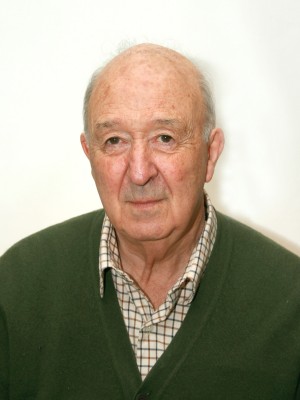Distinguished Artist or Lecturer
The Willson Center Distinguished Artist or Lecturer program supports individual faculty or interdisciplinary groups in bringing leading thinkers and practitioners to campus in support of ongoing and innovative research projects.
2022 – 2023
Emiro Martínez-Osorio
Host: Elizabeth Wright
Title: “Fashioning Nobility: The Portraits of Indigenous Elites at Sutatausa”
Date: October 11, 2022
Emiro Martínez-Osorio is associate professor of Spanish and a fellow at the Centre for Research on Latin America and the Caribbean (CERLAC) at York University, Toronto.
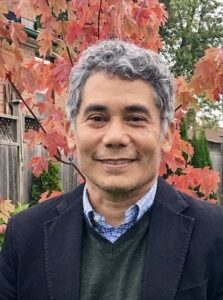
Doreen Baingana
Host: Ed Pavlić
Title: Reading and Conversation
Date: October 26, 2022
Author Doreen Baingana gave a reading presented by the Department of English, The Georgia Review, and the Willson Center.
Baingana is a Ugandan writer and arts manager. Her short story collection, Tropical Fish, won a Grace Paley Prize and a Commonwealth Prize, and she has been shortlisted for the Caine Prize three times. Her other awards include fellowships to the Rockefeller Bellagio Residency, the Bread Loaf Writers Conference, La Porte Peinte residency, the Hambidge Center, a Tebere Arts Playwright residency, a Miles Morland Scholarship and a Sustainable Arts Foundation grant. Baingana has also published two children’s books as well as stories and essays in many journals including Agni, Callaloo, Chelsea, Glimmer Train, The Caravan, Chimurenga, Kwani?, Ibua, Evergreen Review and The Georgia Review. She has adapted her stories for the stage, which have been performed in Uganda and Germany.
Baingana has an MFA from the University of Maryland, College Park; worked at Voice of America radio and as managing editor of Storymoja Africa, a Kenyan publisher; and was chairperson of FEMRITE: the Uganda Women Writers Association. She has led creative writing workshops for two decades in various forums across Africa. She is based in Entebbe, Uganda.
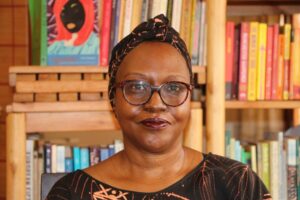
Marylyn Tan
Host: Katie Geha
Title: Reading and Conversation
Date: November 1, 2022
In 2020, Marylyn Tan’s debut volume shocked Singapore’s literary world by winning the country’s premier English-language poetry prize, making its then 27-year-old author the first woman to ever win the award. Moreover, it is not a polite book. It is an instruction book, a grimoire, a call to insurrection to wrest power back from the social structures that serve to restrict, control, and distribute it among those few privileged above the disenfranchised. Whether through occult practices or coding, curses or lyric expression, word and image, these poems make a poetic call to arms.
Queer, female, and Chinese, Tan is a linguistics graduate, poet, and artist who has been performing and disappointing since 2014. Her work trades in the conventionally vulgar, radically pleasurable, and unsanctioned, striving to emancipate and restore the alienated, endangered body. Tan is the poetry reader for Singapore Unbound and founder of multidisciplinary arts collectiveDIS/CONTENT. She lives in Singapore.
This event was co-sponsored by UGA Press, The Georgia Review and the Willson Center.
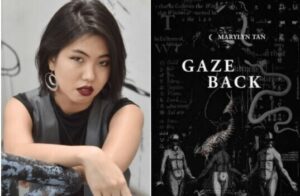
Carol Gluck
Host: Timothy Yang
Title: “World War II and Global Memory Culture: The Case of the ‘Comfort Women'”
Date: November 10, 2022
Carol Gluck is George Sansom Professor Emerita of History at Columbia University.
Gluck’s talk analyzes how the practices and norms of public memory have changed in the 70 years since the end of World War II, creating what Gluck calls a “global memory culture.” Her talk explores how changes in the law, the role of witnesses, the realm of rights, the politics of apology, and concepts of responsibility have transformed our understanding of doing justice to the past.
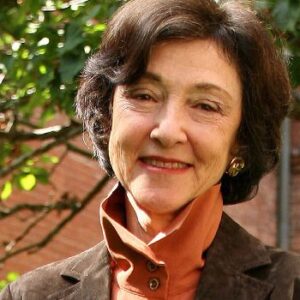
Margaret Samu
Host: Timothy Yang
Title: “Rusalka: Slavic Folklore, Supernatural Women, and the Ukrainian Other”
Date: January 19, 2023
The rusalka is a female spirit from Slavic folklore that appears in poetry, theater, and the visual arts. Nineteenth-century Russian artists depicted rusalki to demonstrate their skill in rendering the female nude, an important theme in European art while portraying a distinctly national subject. In the 1870s, some artists traveled to Ukraine, then part of the Russian Empire, for a greater sense of regional authenticity. In her talk, Margaret Samu explored the connections between Russian imperialist narratives, ethnic stereotypes of Ukraine, and depictions of supernatural women.
The AGAS (Association of Graduate Art Students) lecture was sponsored by the Franklin College of Arts & Sciences, the Willson Center, and the Lamar Dodd School of Art.
After serving as president of the Society of Historians of East European, Eurasian, and Russian Art and Architecture (SHERA) from 2013 until 2015, Margaret Samu is now on the Organizing Committee of the 19v Working Group on Russian Culture, Literature, and the Arts. Based in New York City, she teaches at the Parsons School of Design and lectures at the Metropolitan Museum of Art.
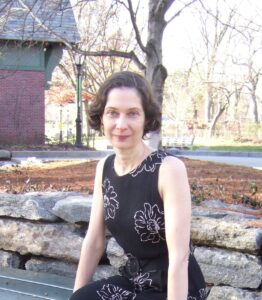
Rosemary Jolly
Host: Alexander Fyfe
Title: “Effluence in Disease: Ebola and HIV as Case Studies of Debility in the Postcolonial State”
Date: March 23, 2023
Rosemary Jolly is Weiss Chair of the Humanities in Literature and Human Rights at Penn State. Her work is concerned with the ways in which representations of violence and reconciliation actually affect inter-governmental, inter-community and inter-personal relations in contexts of conflict. She explores the links between living conditions of extreme deprivation, gender-based violence and coercion, and the HIV pandemic. She has worked with victim-survivors of state sponsored torture, gender-based violence, and communities fractured by illness globally and is particularly concerned with the ethics of working with highly vulnerable communities in research and development.
She has published in the fields of South African literature and culture, postcolonial theory, and the critical medical humanities. Her work has involved mixed quantitative and qualitative methodologies. She is particularly experienced in qualitative analysis of oral testimony and tools of qualitative research that involve embodied gesture in addition to conventional verbalization.
This lecture is sponsored by the Willson Center for Humanities and Arts, the African Studies Institute, and the Department of Comparative Literature.
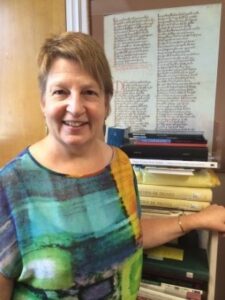
2021 – 2022
Seyong Kim
Host: Lisa Fusillo
Title: “A Personal Story of Trans-culturalism in Dance in a Globalized Society”
Date: October 19, 2021
Seyong Kim is a Korean dance artist. He presented a lecture and demonstraton about his international performing and choreographic career, providing his embodied perspective on trans-culturalism in this globalized society.
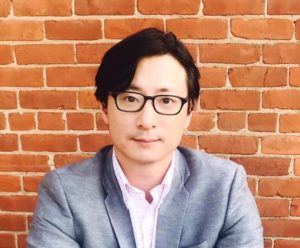
Aaron Decker
Host: Demitra Thomloudis
Title: “Queer Monsters Hiding Under Your Skin”
Date: October 27, 2021
This lecture was presented by the jewelry and metalwork area of the Lamar Dodd School of Art, with support from the Willson Center. It was sponsored in part by the Ann Orr Memorial Fund and Phi Beata Heata.
Decker’s work pulls together memories from his military childhood and queers them with enameled toy references. Layers of glass, metal, and color reflect back the moments, objects, and queer undercurrents of an artist struggling with the love of violent objects and the mediation of the masculinity that comes with them.
An accomplished poet as well as an immensely inventive enamelist, Aaron Decker creates wearable forms that are both personally referential and resoundingly universal. Much of the layered imagery in his work has to do with childhood memories – some pleasant and reassuring, others, darker and more foreboding. Raised in a military family, he moved frequently while growing up and came out to his family when he was 16. As the gay son of a military father, he grew up an outsider, developing deeply ambivalent feelings about the US military and its aggressive ideals. Many of the allusions in his work (medals, planes, camouflage, etc.) reference this military context and reflect Decker’s astute critical stance.
Decker is a jewelry artist based in Detroit. He is the recipient of Mercedes Benz Emerging Artist Award 2015 and the MARZEE Graduate prize 2015. He Received his MFA from Cranbrook Academy of Art in may 2015. In 2012 he was a recipient of The Windgate Fellowship, which allowed him to participate as an Artist-In-Residence in the Turnov International Jewelry Symposium, Turnov, Czech Republic, with the Association of Contemporary Portuguese Jewelers and with the Estonian Academy of Fine Arts. Additionally, Aaron Decker’s work has been shown in exhibitions in the USA, Netherlands, China, Germany and more.
During his visit, Decker also gave an enameling demonstration and workshop for students in the jewelry and metalworking area.
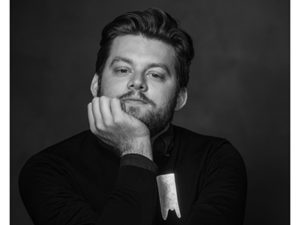
Lisa Tan
Host: Katie Geha
Date: January 12, 2022
Lisa Tan is an American artist and educator based in Stockholm, Sweden. She works with video, photography, text, installation, and other gestures. Her own experiences of desire, loss and otherness are drivers for explorations into consciousness, the formation of individual subjectivity, and the role that representation plays in shaping a person’s relationship to the world and to others. Writing figures largely in her work, and she regularly draws from literature, literary theory, and the history of photography.
She received an MFA from the University of Southern California (USC) in Los Angeles, where she lived for several years, before relocating to New York. In the years following, she pursued her art and exhibition-making, while also working a day job at an interior architecture firm. In 2010, she was accepted to the practice-based PhD program at Valand Academy, University of Gothenburg. This, along with a partner based in Stockholm, is what eventually brought her to Sweden.
Tan’s work was presented in the 11th Göteborg International Biennial of Contemporary Art (GIBCA) (2021), osloBIENNALEN First Edition (2019-2020), ever elusive, Transmediale festival, Haus der Kulturen der Welt (2017), Why Not Ask Again?, the 11th Shanghai Biennale (2016), Surround Audience, the Triennial exhibition at the New Museum (2015). Her artist book Sunsets, Notes From Underground, and Waves, is published by and available at Archive Books, Berlin.
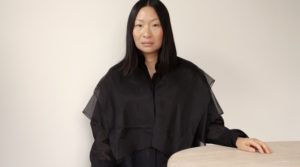
Eunmi Ko
Host: Emily Koh
Date: February 17-18, 2022
Eunmi Ko, associate professor of piano at the University of South Florida and founder of the Contemporary Music Project, visited the Hugh Hodgson School of music for a piano masterclass, a workshop with composition students, and a piano recital, all held at the UGA Dancz Center for New Music.
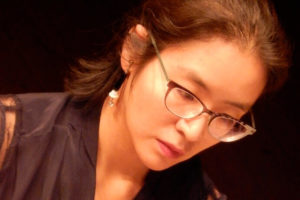
Unheard-of Ensemble
Host: Peter Van Zandt Lane
Date: March 19, 2022
The Unheard-of Ensemble performed Fire Ecologies, a fifty-five minute unique musical and visual experience that explores American landscapes through the lens of climate change, along with a pair of shorter pieces in their concert at the UGA Dancz Center for New Music.
Composer Christopher Stark and video artist Zlatko Ćosić embarked on a journey across the United States capturing audio and video for this multimedia experience. The work incorporates field recordings of the 2020 California wildfires along with sonic and visual imagery from Chris’s trip across Montana, Oregon, and California as well as parts of Colorado. Zlatko gathered footage from the American heartland surrounding Missouri as well as long form explorations of nature surrounding St. Louis. Ford Fourqurean from Unheard-of gathered footage from New York and the Gowanus Canal with help from the Gowanus Dredgers Canoe Club and from the Gowanus Canal Conservancy. Stark created this fifty-five minute work that can be experienced both in concert halls as well as in nature. Ćosić’s video art developed for the live performance adds to the immersion. Throughout the 2021-22 season, Stark, Ćosić, and Unheard-of are working together to gather more sounds and footage to further develop the work as Unheard-of travels on tour across America.
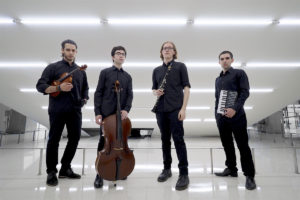
Pamela Colombo
Host: Betina Kaplan
Date: April 29, 2022
Pamela Colombo of Université Laval, Canada, discussed her work on forced displacements in Latin America during the Cold War.
Her visit was part of Latin American Works of Memory: Rethinking Transnational and Local Concepts and Devices, an interdisciplinary international conference co-organized by the Department of Romance Languages and the Latin American and Caribbean Studies Institute.
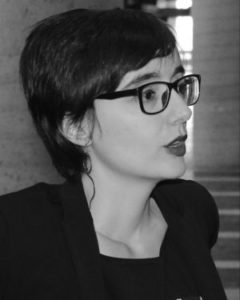
Elizabeth Jelin
Host: Betina Kaplan
Date: April 29, 2022
Elizabeth Jelin of Universidad Nacional de San Martin, CONICET & IDES, discussed the past and current state of Memory Studies in Latin America during her keynote conversation with Evelyn Autry (UGA, PhD 2020) of Rutgers University.
Jelin’s visit was part of Latin American Works of Memory: Rethinking Transnational and Local Concepts and Devices, an interdisciplinary international conference co-organized by the Department of Romance Languages and the Latin American and Caribbean Studies Institute.
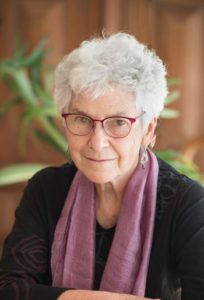
Claudia Feld
Host: Betina Kaplan
Date: April 29, 2022
Claudia Feld of CONICET & IDES discussed her work on the circulation of the first photographs of Argentinean human rights violator Alfredo Astiz.
Her visit was part of Latin American Works of Memory: Rethinking Transnational and Local Concepts and Devices, an interdisciplinary international conference co-organized by the Department of Romance Languages and the Latin American and Caribbean Studies Institute.
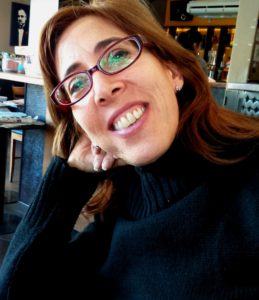
2020- 2021
Jill Bradbury
Host: Sujata Iyengar
Title: “Shakespeare and the Poetics of American Sign Language”
Date: April 20, 2021
Jill Bradbury, chair of English at Gallaudet University, spoke on “Shakespeare and the Poetics of American Sign Language.” Bradbury studies ASL and Deaf+ performance of Shakespeare. The lecture, transcribed and ASL interpreted, was presented by the department of English with sponsorship from Georgia Humanities and the Wilson Center.
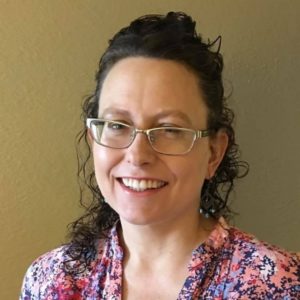
Jan Stubbe Østergaard
Host: Mark Abbe
Title: “Color into the Equation: Classical Greek Sculpture in a New Light”
Date: February 24, 2021
Jan Stubbe Østergaard, Emeritus Research Curator, Ny Carlsberg Glyptotek, Copenhagen, is an internationally esteemed expert on Greek and Roman art. Østergaard has pioneered the modern study of the painting and gilding (polychromy) that defined the aesthetics of ancient marble statuary. He directed the first systematic interdisciplinary study of color on the important museum collections of Greek and Roman marble sculpture at the Ny Carlsberg Glyptotek, Copenhagen. In this role he edited the pioneering series of digital publications Tracking Colour I-IV and the widely-heralded exhibition and catalogue Transformations: Classical Sculpture in Colour (2014).
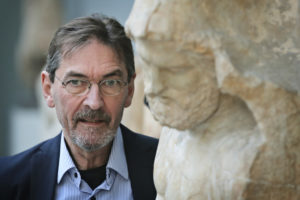
Silas Munro
Host: Mark Callahan
Title: “W.E.B. Du Bois’s Data Portraits: Visualizing Black America”
Date: November 11, 2020
This presentation and discussion by Silas Munro, associate professor of communication arts, Otis College of Art and Design, was hosted by Ideas for Creative Exploration with the support of the Willson Center.
Munro is a partner of Polymode, a bi-coastal design studio, and Chair Emeritus at Vermont College of Fine Arts. He has emerged as one of the most exciting practitioners of community-engaged design and as an influential scholar known for his contributions to W. E. B. Du Bois’s Data Portraits: Visualizing Black America, published by Princeton Architectural Press in late 2018. The project has been featured in articles in Smithsonian Magazine, The New Yorker, and Black Perspectives (African American Intellectual History Society).
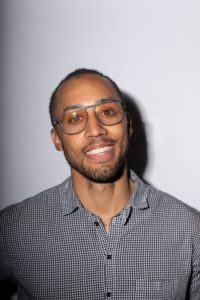
Sheri Hagen
Host: Berna Gueneli
Title: Virtual screening and conversation on At Second Glance
Date: October 20, 2020
A virtual screening of At Second Glance (Auf den zweiten Blick, 2012) was followed by a discussion with the director. Nigerian-German filmmaker and actress Sheri Hagen took part in a virtual discussion about her award-winning film. Also joining the discussion was Olivia Landry, assistant professor of German at LeHigh University in Pennsylvania, author of the book Movement and Performance in Berlin School Cinema.
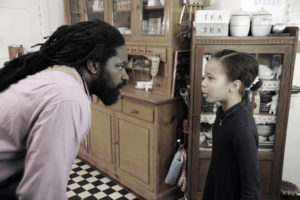
Joselli Deans
Host: Lisa Fusillo
Title: “Timeline of Events and Contributions by African American Ballet Artists in the 20th & 21st Centuries” (Oct. 19); “Black Ballerinas Dancing on the Edge: The Cultural Politics in Delores Browne’s and Raven Wilkinson’s Careers” (Oct. 26)
Date: October 19 & 26, 2020
Joselli Deans is a leading scholar on the topic of African Americans in ballet and a former dancer with the Dance Theatre of Harlem. An artist, scholar and educator, Deans has taught at Temple University, Eastern University and Bryn Mawr College.
Deans gave two lectures hosted by the department of dance, with sponsorship from the First Year Odyssey Program and the Willson Center.
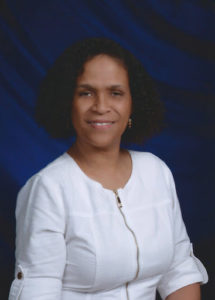
Eddie Glaude
Host: Carolyn Medine
Title: “James Baldwin for Our Times: A Talk with Eddie Glaude”
Date: September 29, 2020
Eddie Glaude, James S. McDonnell Distinguished University Professor and chair of the department of African American studies at Princeton University, took part in a virtual conversation with Ed Pavlić, Distinguished Research Professor of English, African American studies, and creative writing at UGA. The two discussed Glaude’s 2020 book, Begin Again: James Baldwin’s America and Its Urgent Lessons for Our Own, and took questions from students in the African American studies course Black Lives Matter in the Time of COVID.
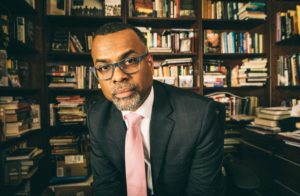
2019- 2020
Elisabeth Lloyd
Host: Edward Halper
Title: “Why Storylines can Provide Evidence for Climate Change in Extreme Events: The Risks of False Negatives”
Date: February 21, 2020
Elisabeth Lloyd spoke as part of the Scott & Heather Kleiner Lecture Series presented by the UGA Department of Philosophy. Lloyd is a Distinguished Professor of History and Philosophy of Science and Medicine and Professor of Biology at Indiana University. She is also an affiliated Faculty Scholar with the Kinsey Institute for Research as well as an adjunct faculty member at the Center for the Integrative Study of Animal Behavior.
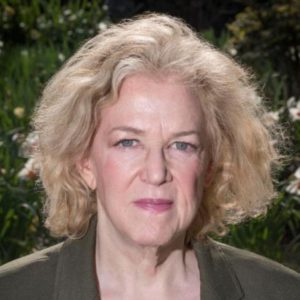
Julio Premat
Host: Nicolas Lucero
Title: “The Utopia of the Past in Contemporary Literature”
Date: February 4, 2020
Julio Premat is professor of Latin American literature at Université Paris 8 – Institute Universitaire de France. His lecture was in Spanish and the following discussion in Spanish, French and English. The event was presented in partnership with the Department of Romance Languages.
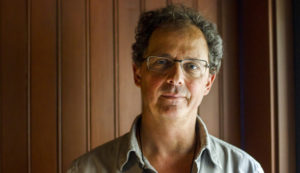
Julian Boal
Host: Kevin Burke
Title: “Theatre of the Oppressed in the World: How Theatre Can Effect Change”
Date: November 25, 2019
Julian Boal is co-founder and pedagogical coordinator of the Escola de Teatro Popular, Rio de Janeiro.
Boal is a teacher, researcher, and internationally-active and world-renowned practitioner of Theatre of the Oppressed. He has facilitated workshops in more than 25 countries and collaborated on several international theatre festivals in India with Jana Sanskriti, in Spain with Pa’tothom, in Portugal with Óprima, in Croatia with the Istrian National Theater, in France with GTO-Paris, and in Brazil with CTO-Rio. Boal is a founding member of Ambata, Theatre of the Oppressed Group–Paris and Féminisme Enjeux, author of Images of a Popular Theatre (Hucitec, 2000), co-editor of the DVD & essay booklet Theatre of the Oppressed in Actions (with Kelly Howe and Scot McElvany, Routledge, 2015), and the forthcoming anthology: The Routledge Companion to Theatre of the Oppressed (with Kelly Howe and José Soeiro). He also collaborated with Sergio de Carvalho as assistant playwright for two recent plays: Those Who Stay (2015) and The Bread and The Stone (2016).
The majority of Western performance practices involve a strict division between actors and audience. Augusto Boal and other practitioners of Theatre of the Oppressed have developed methods that involve and engage the audience directly, enabling them to move from being mere spectators in an auditorium to onstage “spect-actors,” working alongside a company of other actors to explore, to understand, and (hopefully) to change the world, one urgent oppression at a time. This talk (with a question-and-answer session to follow) will focus on how Theatre of the Oppressed was born in a specific context and how it evolved from a theatre technique the emerged from the global south to a technique used all over the world. More specifically, how have the changes in terms of the scale of Theatre of the Oppressed’s popularity over time created new problems and questions? In other words, how does a theatre technique that was created to fight against dictatorships and extremely centralized political parties evolve in a world of so-called participatory democracies and Facebook? Finally, what can Theatre of the Oppressed do in the face of the rise of fascism, specifically in Brazil?
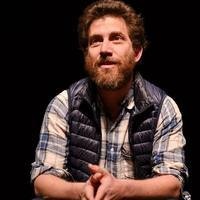
Rebecca J. Scott
Host: Jennifer Palmer
Title: “The House on Bitterness Street: Maternity, Slavery, and a Fragile Freedom”
Date: November 7, 2019
Rebecca J. Scott is Charles Gibson Distinguished University Professor of History and Professor of Law at the University of Michigan.
Scott holds degrees from Radcliffe College/Harvard University, the London School of Economics, and Princeton University. Her accolades include a MacArthur Prize Fellowship and a Guggenheim Fellowship; she is also a member of the American Academy of Arts and Sciences. Her research and teaching center on civil rights, the boundaries of citizenship in historical perspective, and law in slavery and freedom.
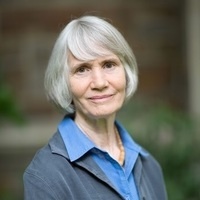
Noa Even
Host: Emily Koh
Date: October 30, 2019
Cleveland-based saxophonist and Kent State faculty Noa Even explores themes of human connection with “atomic,” a commissioning project of four new works for solo saxophone, interactive electronics, and video. The impetus behind “atomic” is the idea that finding or cultivating common ground with individuals from diverse backgrounds leads to greater awareness, understanding, and empathy. In close collaboration with Even, the composers and video artists of “atomic” focus on the following topics: the long-lasting affects of human interactions, the increasingly visible and thriving transgender community in the United States, silenced voices resulting from stricter American immigration laws, and regret, a universal human emotion.
Program:
Imprints in Time (2019) Christopher Biggs
bodies immutable (2019) LJ White / Jason Charney
b(locked.orders) (2019) Emily Koh / Michiko Saiki
Do I Regret? (2019) José Martínez / Michael Bruner

John Kulvicki
Host: Rene Jagnow
Title: “Reshaping the Arts of Space”
Date: October 25, 2019
John Kulvicki is associate professor of Philosophy at Dartmouth. Kulvicki’s work focuses primarily on perception and pictorial representation to explore the question, “How do we use pictures and other representations to learn about the world around us?” He spoke as part of the Scott & Heather Kleiner Lecture Series presented by the UGA Department of Philosophy.
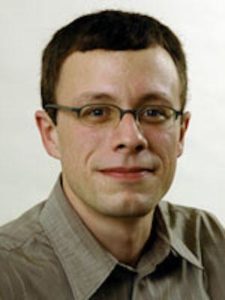
Alison Bailey
Host: Chris Cuomo
Title: “On Anger, Silence, and Epistemic Injustice”
Date: September 27, 2019
Alison Bailey is a Professor of Philosophy at Illinois State University where she directs the Women’s and Gender Studies Program. She spoke as part of the Scott & Heather Kleiner Lecture Series presented by the UGA Department of Philosophy.
Bailey’s scholarship engages issues at the intersections of feminist theories, philosophy of race, critical whiteness studies, and social epistemology (especially epistemic injustice and ignorance). She was chosen to give the College of Arts and Sciences Distinguished Lecture at her university earlier this year. Her recent work on anger appears in the Royal Institute of Philosophy’s supplemental volume on “The Harms and Wrongs of Epistemic Practice,” and in The Logic of Racial Practice: Embodiment, Habitus, and Implicit Bias. Her scholarship on whiteness and ignorance has appeared in Hypatia: A Journal of Feminist Philosophy, Social Epistemology Review and Reply Collective, and Philosophy Today. She is currently at work on a new book titled The Weight of Whiteness: Feminist Engagements with Privilege, Race, and Ignorance, which will be published next year as part of the Lexington Books Philosophy or Race Series. She also co-edited The Feminist Philosophy Reader with UGA’s Chris Cuomo.
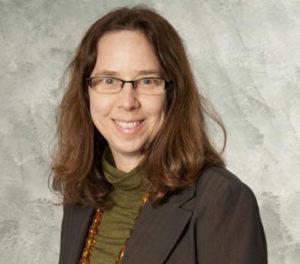
2018 – 2019
Marcus Miller and Rob Schneiderman
Host: David Gay
Date: March 29, 2019
In live musical performance and open discussion, Marcus Miller and Rob Schneiderman demonstrate/explain analogies between the dynamics of the discovery/creation/learning of both music and mathematics. As a consequence of the abstract natures of music and mathematics these analogies can provide insight into other human disciplines.
In addition to their Dancz Center event, Miller and Schneiderman will perform at 8 p.m. March 29 at Hendershot’s, 237 Prince Ave.
Marcus Miller graduated from Harvard University with a degree in mathematics. After a stint working for a hedge fund, he has since been traveling the world playing music, both leading his own groups as well as performing with jazz artists such as Grammy-nominated vocalist Jazzmeia Horn and Late Show musical director/pianist Jon Batiste. Miller has performed at the Obama White House, and has studied music production and engineering under grammy-winning sound engineer “Bassy” Bob Brockman (Notorious B.I.G, Herbie Hancock, D’Angelo). Miller has spoken at the New Jersey Association of Music Educators, and was noted as an Artist of Distinction by the State of New Jersey. He is the creator of the Math+Music Project, and is currently the host/creator of the Quadrivium series at New York’s Museum of Mathematics, while he continues to study and teach mathematics.
Rob Schneiderman joined the Lehman College CUNY department of mathematics faculty in 2006 after a busy career as a musician, including performances and recordings with jazz luminaries such has Eddie Harris, James Moody, Charles McPherson, JJ Johnson, Jimmy Heath, Clifford Jordan, Art Farmer and Harold Land, as well as 10 recordings as a leader for the Reservoir Music label and a more recent Tone Twister release on the Hollistic MusicWorks label. In 2001 Schneiderman received a PhD in mathematics from UC Berkeley under the guidance of topology guru Robion Kirby, and before his current professorship at Lehman, he had postdoc positions at the Max-Planck-Institute for Mathematics in Bonn, NYU’s Courant Institute and UPenn. His research is focussed on studying 3-dimensional and 4-dimensional spaces. In addition to many research articles in mathematics journals, Rob’s musicomathematical essay “Can One Hear the Sound of a Theorem?” was published in the Notices of the American Mathematical Society and in the collection Best Writing on Mathematics 2012, Princeton University Press.
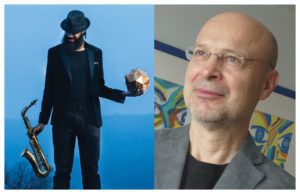
Julia Annas
Host: Edward Halper
Date: March 29, 2019
Julia Annas is one of most important and influential scholars of ancient philosophy. Many of her books (at least 14 to date) and articles (more than 100) have been translated into multiple languages and are very widely cited. She was the founding editor of the important journal, Oxford Studies in Ancient Philosophy. After graduating from Oxford, she did her PhD with G.E.L. Owen at Harvard. Her dissertation, a close study of Aristotle’s Metaphysics, Books M and N, became her first book. Much of her subsequent work has centered on ethics, particularly on Plato’s ethics. She argues that, like Aristotle, Plato advances a character ethics. That means that ethics is dependent not on rules and maxims, but on cultivating the moral skills that allow one to act well. She has made Plato’s ethics not just relevant to contemporary moral philosophy, but a significant alternative to other contemporary accounts of morality. Despite its intellectual power, her work is usually very accessible to a wide audience.
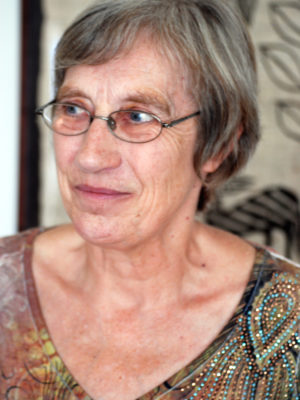
Fernando Degiovanni
Host: Nicolas Lucero
Date: March 18, 2019
Fernando Degiovanni is professor of the PhD Program in Latin American, Iberian, and Latino Cultures at The Graduate Center, CUNY. His current research focuses on issues of intellectual performativity, embodiment and spectacularizarion in modern Argentina. Drawing on contemporary theory and extensive archival research, his scholarship explores liminal inscriptions of lettered bodies in alternative spaces of communal engagement, such as mass demonstrations, urban interventions, and lecture halls.
Fernando Degiovanni is the author of Los textos de la patria: Nacionalismo, políticas culturales y canon en Argentina (Beatriz Viterbo Editora, 2007) and Vernacular Latin Americanisms: War, the Market, and the Making of a Discipline (University of Pittsburgh Press, 2018), a book that explores the competing agendas that shaped the emergence of Latin Americanism as a field of critical debate and scholarly inquiry between the 1890s and the 1960s. He has also guest-edited the dossier Comunidades y relatos del libro en América Latina (2015). His articles have appeared in numerous journals, including Revista Iberoamericana, Revista de Crítica Literaria Latinoamericana, Journal of Latin American Cultural Studies, Variaciones Borges, Hispamérica, and Cuadernos Hispanoamericanos, as well as in major reference works such as A Companion to Latin American Literature and Culture, edited by Sara Castro-Klaren, and Historia crítica de la literatura argentina, edited by Noé Jitrik.
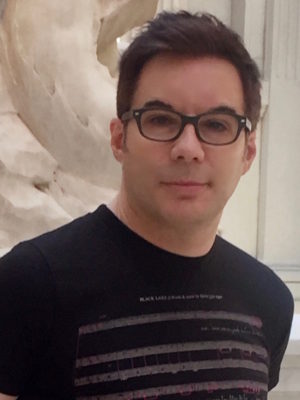
Roberto Tejada
Host: James Enos
Date: January 24, 2019
Roberto Tejada is the Hugh Roy and Lillie Cranz Cullen Distinguished Professor in Creative Writing and Art History at the University of Houston. In this lecture he will present images and narratives that relate a transnational/translational poetics engaging the visual and language arts of 1960-1970s Pop as connected to media and urbanism in Mexico, Brazil, and the Chicano/a U.S. Southwest. The entry point to this itinerary is the late great 1960s avant-garde literary journal El corno emplumado, edited in Mexico City by Margaret Randall and Sergio Mondragón.
Tejada is the author of art histories that include National Camera: Photography and Mexico’s Image Environment (2009); a monograph on pioneering Chicana conceptual artist Celia Alvarez Muñoz (2009), and such catalog essays as “Los Angeles Snapshots” in Now Dig This!: Art and Black Los Angeles, 1960-1980 (Hammer Museum, 2011); as well as poetry collections that include Full Foreground (2012), Exposition Park (2010), Mirrors for Gold (2006), and Todo en el ahora (2015). He founded and co-edited the journal Mandorla: New Writing from the Americas, a multilingual annual of poetry and translation (1991-2014). His poetry and creative research develop the relationship between sight, display, public speech, and spectacle; he is at work on a trans-American project that examines specific art scenes of 1960s-1970s Los Angeles, 1980s-1990s Mexico City, and present-day São Paulo.
Tejada’s visit is sponsored by the Lamar Dodd School of Art, the College of Environment + Design, the Creative Writing Program, and the Willson Center.
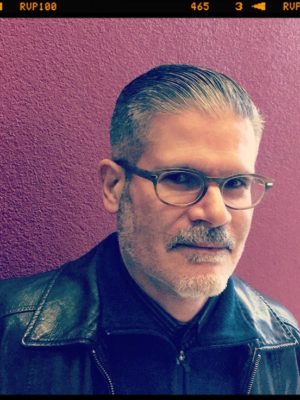
Elizabeth Catte
Host: Callan Steinmann
Date: November 8, 2018
Elizabeth Catte, a writer and historian based in the Shenandoah Valley, holds a PhD in public history from Middle Tennessee State University. She is co-owner of Passel, a socially-conscious historical consulting firm, and editor-at-large for West Virginia University Press. In 2018 she published What You Are Getting Wrong About Appalachia, lauded as an “intelligent antidote to the untruths of our political moment” in which Catte uses radical history to challenge perceptions of the region as a hub of white, working-class woe. She is the co-editor of 55 Strong: Inside the West Virginia Teachers’ Strike (Belt, 2018); her work has been featured on NPR’s “All Things Considered,” and in The Guardian, The Nation, and The New Yorker, among many outlets.
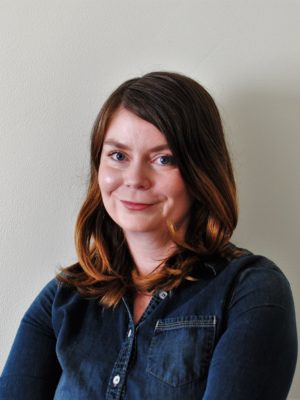
Javier Auyero
Host: Pablo Lapegna
Title: “The Ambivalent State: Unpacking Police-Trafficker Collusion in Latin America”
Date: November 7, 2018
Drawing on a unique combination of long-term ethnographic fieldwork and documentary evidence from court cases involving drug-trafficking groups in poor and high-crime neighborhoods in Argentina, this talk will examine the clandestine connections between participants in the illicit drug trade and members of state security forces, and how they impact everyday experiences of violence. The talk will present three main findings: a) traffickers use these illicit relationships to maintain control of the territory central to their illegal trade, b) clandestine relationships between cops and traffickers feed violence at the urban margins, and c) collusion fosters widespread cynicism among residents about law enforcement. This study makes three scholarly contributions. First, it expands the literature on the inner-workings of covert relationships between drug trade participants and agents of the state. Second, it extends the scholarship on drug-related violence to a heretofore under-examined social and geographical universe, and refines the argument about that relationship by scrutinizing the clandestine participation of state actors. Third, it examines residents’ perceptions of police complicity as an under-explored source of legal cynicism.
Javier Auyero is Professor of Latin American Sociology at the University of Texas at Austin. His main areas of research, writing, and teaching are poverty and marginality, political ethnography, and urban violence. He has written or edited fourteen books and authored more than forty-two articles about these topics, including Poor People’s Politics (Duke University Press, 2000), Contentious Lives (Duke University Press, 2003), Routine Politics and Violence in Argentina (Cambridge University Press, 2007), and Patients of the State (Duke University Press, 2012). Together with Débora Swistun, he co-authored Flammable. Environmental Suffering in an Argentine Shantytown (Oxford University Press, 2009), and together with María Fernanda Berti he co-authored In Harm’s Way. The Uses and Forms of Interpersonal Violence at the Urban Margins (Princeton University Press, 2015). He was the editor of journal Qualitative Sociology from 2005 to 2010, and currently directs the Urban Ethnography Lab at UT-Austin.
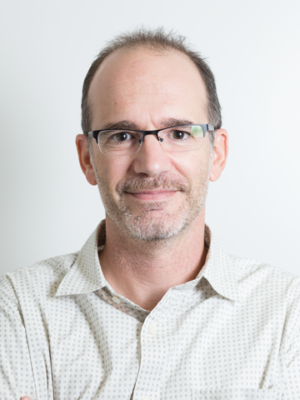
Elizabeth Corr
Host: Mark Callahan
Title: “The case for collaboration: How NRDC works with Artists to bolster Environmental Advocacy”
Date: October 31, 2018
Elizabeth Corr works with artists, architects, and designers to heighten public awareness of and interest in the environmental issues that face today’s communities. She is the Director of Art Partnerships at the Natural Resources Defense Council (NRDC), an international environmental nonprofit organization with over three million members. Corr launched the NRDC’s Artist-in-Residence program, an innovative platform for thoughtful and sustained collaboration between artists and environmental leaders. As a curator she has worked with artists such as Jenny Kendler, Sipho Mabona, Antonin Fourneau, and the Luftwerk collective. Corr holds a master’s degree in African Studies and a bachelor’s degree in psychology and gender/women’s studies from the University of Illinois at Urbana-Champaign. She was recently nominated for the Pritzker Emerging Environmental Genius Award, recognizing scientists, entrepreneurs, engineers, activists, or artists who stand poised to make a game-changing difference.
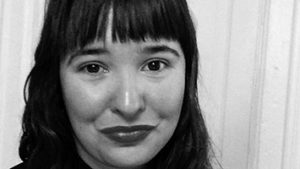
Lewis Gordon
Host: Michael Lindquist
Title: “Kinds of Invisibility in Euromodernity”
Date: October 12, 2018
Lewis Gordon is professor of philosophy at the University of Connecticut; honorary president of the Global Center for Advanced Studies; European Union Visiting Chair in Philosophy at Université Toulouse Jean Jaurès, France; and honorary professor in the Unit of the Humanities at Rhodes University, South Africa. His books include Bad Faith and Antiblack Racism (Humanities International Press, 1995), Fanon and the Crisis of European Man (Routledge, 1995), Existence in Black (Routledge, 1996), Fanon: A Critical Reader (Wiley-Blackwell, 1996), Her Majesty’s Other Children (Rowman and Littlefield, 1997), Existentia Africana (Routledge, 2000), A Companion to African-American Studies (Wiley-Blackwell, 2006),Not Only the Master’s Tools (Routledge, 2006), Disciplinary Decadence (Routledge, 2007), An Introduction to Africana Philosophy (Cambridge University Press, 2008), Of Divine Warning (Routledge, 2009), La teoría política en la encrucijada descolonial (Del Signo ediciones, 2009), What Fanon Said (Fordham University Press and Hurst Publishers, 2015), La sud prin nord-vest: Reflecţii existenţiale afrodiasporice (Cluj, Romania: IDEA, 2016), Geopolitics and Decolonization: Perspectives from the Global South (London, UK: Rowman & Littlefield International, 2018), and the forthcoming Fear of a Black Consciousness (Farrar, Straus and Giroux). He edits the American Philosophical Association blog series Black Issues in Philosophy and co-edits the book series Global Critical Caribbean Thought.
This talk offers a reading of “modern” that challenges the tendency to equate it with “European.” This tendency leads to several kinds of invisibility, in which Gordon will focus, through phenomenological description and interrogation, on four: (1) racial, (2) indigeneity, (3) gendered, and (4) epistemic.
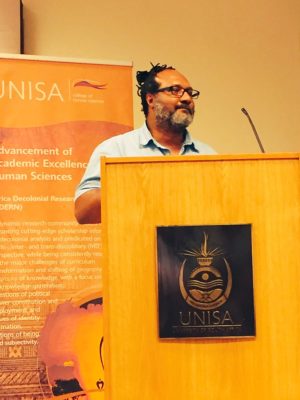
Daniel Balderston
Host: Nicolas Lucero
Title: “Borges and Argentine politics, from ‘Viejo hábito argentino’ to ‘Nuestro pobre individualismo’ (1946)”
Date: September 25, 2018
Daniel Balderston is the Andrew W. Mellon Professor of Modern Languages at the University of Pittsburgh, and has published numerous books including How Borges Wrote (2018) and Los caminos del afecto (2015).
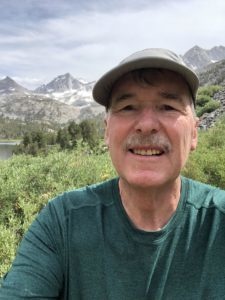
Geoff Knorr
Host: Emily Koh
Title: “Tradition Meets Implementation: Exploring the Music of the World in Civilization VI”
Date: September 13, 2018
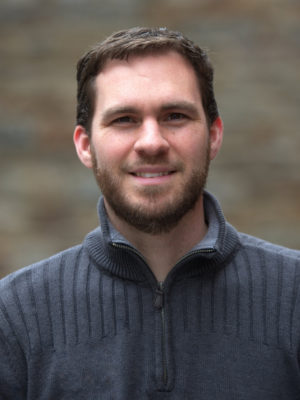
2017 – 2018
Brenda Smith
Host: Stephanie Tingler
Title: “Care of the Aging Voice” and “Incorporating Vocal Styles into the Choral Sound”
Date: April 14, 2018
Brenda Smith teaches studio voice, diction and vocal pedagogy. She has been widely recognized for her contributions to the concept of lifelong singing through proper voice care. Dr. Smith is a lyric soprano with special interests in the recital and concert repertoire. In addition, Dr Smith was translator, collaborator and assistant to Dr Wilhelm Ehmann and Dr Frauke Haasemann, the pedagogues whose work in Germany and the United States developed the concept of voice building for choirs. She is the translator of the book Voice Building for Choirs by Wilhelm Ehmann and Frauke Haasemann (Chapel Hill, NC: Hinshaw Music, Inc.; 1980).
Smith works regularly as consultant, clinician, and conductor with amateur and professional choirs throughout the world. She has been associated with the choirs of St. Ignatius Loyola, the Central City Chorus, and the Dessoff Choirs in New York City, the Mendelssohn Club of Philadelphia, the Cathedral Choral Society of the National Cathedral in Washington, D.C., as well as the choirs of the Epiphany Cathedral in Venice, Fla.
Because of her interest in public and private music education, Smith has been the Two-College Choir Interest Chair for the Southern Division of the American Choral Directors Association and the Florida Repertoire and Standards Chair for Youth and Student Activities. She is a frequent adjudicator and clinician for the Music Performance Assessment Festivals of the Florida Vocal Association.
Smith collaborates regularly with Robert Thayer Sataloff, implementing projects to promote vocal health through the choral experience. A frequent presenter at the International Symposium on the Care of the Professional Voice, sponsored by the Voice Foundation, Smith is the author with Sataloff of the textbook, Choral Pedagogy, now in its second edition, published by Plural Publishing Co.(San Diego, CA, 2006). The book is the only text exclusively devoted to the relationship between vocal pedagogy, choral conducting, and voice science.
Additionally, Smith is the author of Cantare et Sonare: A Handbook of Choral Performance Practice published by Hinshaw Music, Inc (Chapel Hill, NC: 2006). She has presented at the national conventions of the American Choral Directors Association, the American Orff-Schulwerk Association, regional meetings of the American Guild of Organists and the National Association of Teachers of Singing. Smith has published articles on matters of choral and vocal pedagogy in the numerous journals and textbooks.
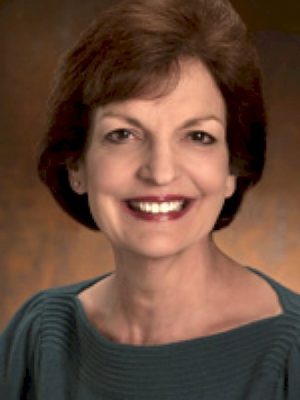
Dale Jamieson
Host: Piers Stephens
Title: “Am I Responsible for Climate Change?”
Date: April 13, 2018
Dale Jamieson is Professor of Environmental Studies and Philosophy, an affiliated Professor of Law, and Director of the Animal Studies Initiative at New York University, as well as being Distinguished Visiting Professor at the Dickson Poon School of Law at King’s College, London, and Adjunct Professor at the University of the Sunshine Coast in Australia. The author of 3 books, most recently “Reason in a Dark Time” (2012), and editor or co-editor of a further 9 volumes, he is recognized as one of the world’s leading environmental philosophers and especially noted for his recent work on climate change. Professor Jamieson’s work is profoundly interdisciplinary, and he has won awards in both the social sciences and the humanities, as well as research funding from the National Science Foundation, the National Endowment for the Humanities, and the Environmental Protection Agency. In addition, he has held visiting appointments at the National Center for Atmospheric Research, Cornell, Princeton, Stanford, Oregon, Arizona State University, and Monash University in Australia. His presentation is supported by the Willson Center for Humanities and Arts.
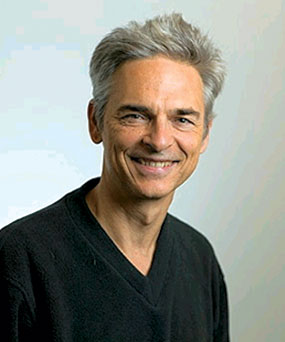
Michele Bogart
Host: Akela Reason
Title: “Public Art and Process in New York City”
Date: March 29, 2018
Michele H. Bogart has taught American visual culture studies at Stony Brook University since 1982. Her areas of expertise are urban design and commercial culture. She has published on public art, memorials, animation, landscape and garden history, photography, illustration, and advertising. Bogart received her M.A. and Ph.D. from the University of Chicago.
She is author of Artists, Advertising, and the Borders of Art, published by the University of Chicago Press in 1995; Public Sculpture and the Civic Ideal in New York City, 1890-1930 (University of Chicago Press, 1989; paperback ed. Washington: Smithsonian Institution Press, 1997), which received the Smithsonian Institution/ Museum of American Art’s Charles C. Eldredge Prize in 1991; and of the prizewinning The Politics of Urban Beauty: New York and Its Art Commission (University of Chicago Press, 2006). She was a member of the editorial advisory board for the “Cultural Studies of the United States” series, published by the University of North Carolina Press, and has served on the editorial boards of The Journal of Urban History and American Art.
Bogart has been the recipient of fellowships from the Smithsonian Institution, National Endowment for the Humanities, the American Council of Learned Societies, the John Simon Guggenheim Memorial Foundation, and the Terra Foundation for American Art. From 1998 through 2003 she served as a member of the City’s design review agency, the Art Commission of the City of New York (now the Public Design Commission), and was for four years its Vice President. She is past president of the Associates of the Public Design Commission and a member of the Commission’s Conservation Advisory Group. She is also a member of the Board of Directors of the New York Preservation Archive Project. Bogart is presently completing a book-length study on public sculpture in New York City from the period spanning Cold War and culture wars, and is beginning exploration of the paintings of Nicolas Poussin.
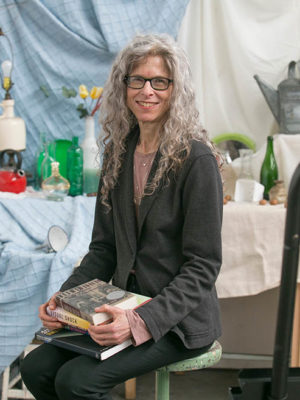
Joseph Salmons
Host: Joshua Bosquette
Title: “Community Structure and Language Shift: The Verticalization Model”
Date: March 26, 2018
A now-emerging model proposes that changes in community structure from ‘horizontal’ to ‘vertical’ provide a coherent motivation for language shift in bilingual communities, drawing on Warren (1978). Warren’s core notion is that key patterns of interaction within communities form ‘two rather distinct types of systemic ties: The relationships through which they are oriented to the larger society beyond the community constitute the community’s vertical pattern, and those that local units share with each other on the local level constitute the community’s horizontal pattern’ (Warren 1978:240). Applied to language, this approach attributes shift to a change from local control of tightly interconnected institutions to more external or ‘vertical’ control of those increasingly less-interdependent institutions, patterns reaching down to social networks of individuals.
Verticalization has a profound impact on language use across a set of fundamentally different domains, from private economic institutions to the broad organization of economic activity in a community, religious and other cultural institutions, and government.
A shift from local to non-local control comes, sooner or later, with a shift to English in the U.S. These structural changes indirectly and over time lead to changes in social networks and patterns of interaction that undermine the minority language within neighborhoods and families.
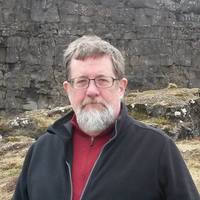
Grace Lin
Host: Jennifer Graff
Title: “Windows, Mirrors and an Extra Adjective”
Date: March 24, 2018
Grace Lin is a New York Times bestselling author and illustrator of picture books, early readers and middle grade novels. Her novel Where the Mountain Meets the Moon was awarded the Newberry Honor in 2010 and Lin’s early reader Ling and Ting was honored with the Theodor Geisel Honor in 2011. Most recently, the cover illustration for her novel When the Sea Turned Silver (a 2016 National Book Award finalist) was displayed at the White House, where she was recognized as a Champion of Change for Asian American and Pacific Islander Art and Storytelling. Many of Lin’s books are about the Asian-American experience because she believes, “Books erase bias, they make the uncommon everyday, and the mundane exotic. A book makes all cultures universal.”
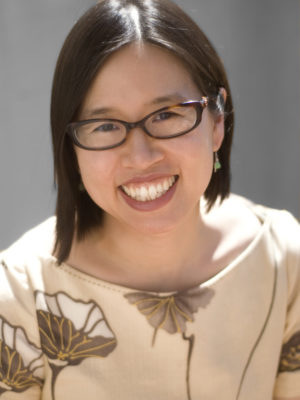
Marc Teicholz
Host: Daniel Bolshoy
Title: Guitar Recital
Date: February 22, 2018
Guitarist Marc Teicholz was awarded first prize at the 1989 International Guitar Foundation of America Competition, the largest, most prestigious contest of its kind in the United States. He was also a prize winner at the 1991 New York East-West Artists Competition.
Described by Gramophone as “arguably the best of the new young guitarists to have emerged,” and by Soundboard magazine as “among the best we have ever heard,” Teicholz’s performances throughout the world include tours of the United States, Canada, Russia, Poland, Switzerland, Southeast Asia, New Zealand and Fiji. His recitals and master classes have received critical acclaim, and he has been featured in concert with orchestras in Spain, Portugal, California and Hawaii.
He has also had new works written specially for him. Most recently, Teicholz debuted Clarice Assad’s Concerto for Guitar, O Saci-Pererê, at the Biasini Festival in San Francisco. Teicholz tours the United States extensively with The Festival of Four. He is featured on the pilot soundtrack for George Lucas’ “Young Indiana Jones,” and has recorded solo CDs for Naxos, Sugo, Menus and Music, and most recently, Guitar Salon International. His latest solo disc, Valseana, presents works performed on historic guitars of the period of each musical selection. On Delos records, he has recently released Open your Heart with soprano Laura Claycomb, featuring mixed 19th and 20th century composers.
For Naxos, Marc Teicholz has made his mark with two collections of Sor’s music already committed to disc. In a show of his versatility, he has also recorded the fifth volume of the collected works for guitar by the 19th Century French virtuoso guitarist and composer Napoleon Coste.
Teicholz, currently on the faculty of the San Francisco Conservatory, teaches in the summer at the California Summer Arts Festival and the Weatherfield Music festival in Vermont. He received his bachelor’s and master’s degrees from the Yale School of Music, and holds a J.D. from the University of California Berkeley Boalt School of Law.
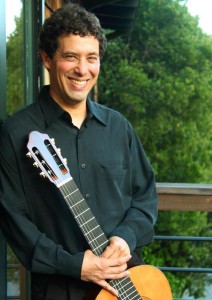
Jessica Silbey
Host: Rachel Gabara
Title: “The Eureka Myth: Creators, Innovators and Everyday Intellectual Property”
Date: February 22, 2018
Jessica Silbey, professor at the Northeastern University School of Law, is a leading scholar and nationally recognized expert on intellectual property and the use of film to communicate about law. Silbey has altered the national conversation about creativity and invention with her recent book, The Eureka Myth: Creators, Innovators and Everyday Intellectual Property (Stanford University Press). Based on a set of 50 interviews with authors, artists, inventors and lawyers, Silbey’s work challenges the traditional notion of intellectual property as merely creating financial incentives necessary to spur innovation. Drawing on her interdisciplinary background and qualitative empirical training, Silbey’s research sheds new light onto the roles intellectual property law play to sustain and frustrate the creative and innovative communities in the work they seek to accomplish.
Silbey earned her law degree as well as her PhD in comparative literature from the University of Michigan. She served as law clerk to Judge Robert E. Keeton of the U.S. District Court for the District of Massachusetts and Judge Levin H. Campbell of the U.S. Court of Appeals for the First Circuit. She also spent three years in private law practice, focusing on intellectual property and reproductive rights.
Silbey is co-editor of the book Law and Justice on the Small Screen (with Peter Robson) and author of numerous law review articles and publications in other venues. In addition to her research on intellectual property, Silbey writes about the use of film as a legal tool (body cams, surveillance video, medical imaging) and the representations of law in popular culture (courtroom dramas, reality television). She is an affiliate fellow at Yale’s Information Society Project and a faculty associate at the Berkman Klein Center for Internet and Society at Harvard University. In January 2016, Silbey was elected chair of the Association of American Law Schools (AALS) national Section on Intellectual Property and appointed to serve on the AALS Presidential Conference Film Committee. She currently serves as co-chair of the New England Chapter for the Copyright Society of the United States.
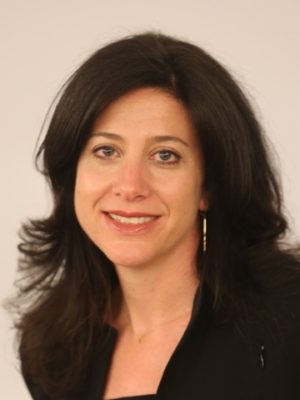
Shu-mei Shih
Host: Yuanfei Wang
Title: “Comparison as Relation: From World History to World Literature”
Date: February 1, 2018
Shu-mei Shih is a professor of comparative literature, Asian languages and cultures, and Asian American studies at the University of California, Los Angeles. Among other works, her book, Visuality and Identity: Sinophone Articulations Across the Pacific (2007), has been attributed as having inaugurated a new field of study called Sinophone Studies. Sinophone Studies: A Critical Reader (2013) is a textbook that she co-edited for the field.
Besides Sinophone studies, her areas of research include comparative modernism, as in the book The Lure of the Modern: Writing Modernism in Semicolonial China, 1917-1937 (2001); theories of transnationalism, as in her co-edited Minor Transnationalism (2005); critical race studies, as in her guest-edited special issue of PMLA entitled “Comparative Racialization” (2008); critical theory, as in her co-edited Creolization of Theory (2011); Taiwan studies, as in her guest-edited special issue of Postcolonial Studies entitled “Globalization and Taiwan’s (In)significance” and the co-edited volume Comparatizing Taiwan (2015) and Knowledge Taiwan (2016).
She is currently working on two monographs entitled Empires of the Sinophone and Comparison as Relation, and two co-edited volumes: Keywords of Taiwan Theory and World Studies: Theories and Debates.
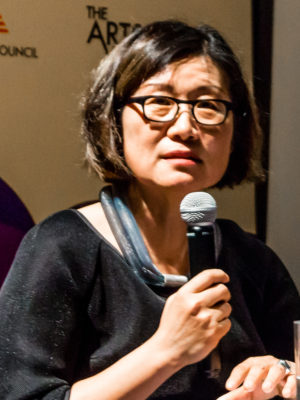
Robert Hopkins
Host: Renee Jagnow
Title: “TBA”
Date: February 2, 2018
Robert Hopkins is a professor and chair of the department of philosophy at NYU. His research is mostly in the philosophy of mind and aesthetics. He has worked on pictorial representation and picture perception (the subject of a book, Picture, Image and Experience, 1998), on other topics central to the philosophy of the visual arts, including the aesthetics of sculpture, photography, painting and film; and on other mental states that relate in interesting ways to our perception of pictures: perception itself, experiential imagining, and episodic memory. He’s also written on the epistemology and metaphysical status of aesthetic and moral judgement.
Work on these topics has appeared in various journals, including Mind, Philosophy and Phenomenological Research, Nous, Journal of Philosophy and Philosophical Review. In 2001 he was awarded a Philip Leverhulme Prize in recognition of his research. For several years he was honorary secretary of the Mind Association. He is current president of the European Society for Aesthetics.
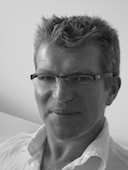
Werner Fritsch
Host: Alexander Saber
Title: “Faust: Song of the Sun, Part II”
Date: November 1, 2017
Werner Fritsch is the author of numerous award-winning theater and radio plays, a highly acclaimed novel and the writer and director of three experimental films. His cutting-edge work, moving between different media, has received widespread acclaim in Germany and he has been awarded numerous prestigious scholarships and prizes, including Best German Audio Book for Enigma Emmy Goering (2009) and the prestigious Kulturpreis Bayern (Bavarian Prize for Culture). The German national magazine Der Spiegel called him “Germany’s boldest poet.”
Fritsch’s extended film poem “Faust: Song of the Sun” reflects on a central moment in Johann Wolfgang Goethe’s seminal play Faust, offering a stream of images and text probing Faust’s notion of contentment in a beautiful moment. Attempting to counter the pervasive notion of globalization as taking over the world, Fritsch’s film explores the diversity of foreign cultures and different natures, highlighting “a certain human vision” of “watching the world with open eyes.” “Faust: Song of the Sun” is a cultural adventure addressing fundamental questions about human relations, faith, the nature of beauty and the mythical foundations of reality. Filmed all over the world in India, California, Egypt, New York, Germany, Norway, Nepal, Mexico and New Zealand, the film has been described as “ …a delirium of wild colours and idyllic nature, images of wonderful music and powerful lyrics…. This film is pure madness” (Der Spiegel).
The first episode of “Faust: Song of the Sun” was screened at UGA in 2016. This year the artist will present the second part in substantial clips with an introduction, synopsis and commentary.
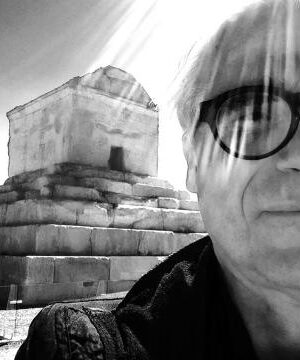
Vinzenz Brinkmann
Host: Mark Abbe
Title: “The Enigma of the Riace Bronzes: A New Approach”
Date: October 19, 2017
In 1972 an amateur snorkeler on holiday at the isolated beach of Riace in Calabria (southern Italy) by chance discovered two exceptionally well-preserved monumental ancient bronze statues partially buried on the seabed. Dating from c. 460 BC and representing Greek warriors, the so-called Riace Bronzes remain the highest quality Greek bronze statuary to survive from the classical world. They arrestingly exemplify how fifth century Greek sculptors developed a new style of representation in bronze to create lifelike, spatially dynamic figures with acute psychological characterization. Yet, despite exhaustive study over the last 45 years, there remains no consensus about whom or what exactly the Riace Bronzes represent. Nor is it clear where or how they were displayed in antiquity. Are there overlooked clues that might allow the riddle of these famous bronzes to be solved?
Vinzenz Brinkmann, one of the foremost international experts of classical Greek sculpture and Head of Antiquities at the Frankfurt Liebieghaus, will share his innovative, if not revolutionary, reinterpretation of these iconic sculptural masterpieces from the fifth century B.C.
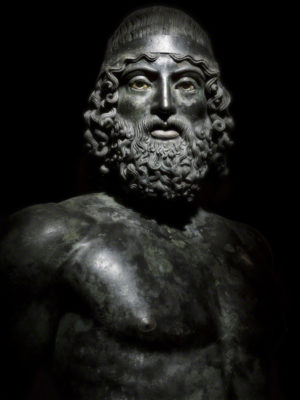
José Antonio Rodríguez Garrido
Host: Elizabeth Wright
Title: “Identidades múltiples y agencias culturales en la construcción de la biografía de Juan de Espinosa Medrano (¿1629?-1688)”
Date: October 11, 2017
José Antonio Rodríguez Garrido is a professor in the department of humanities at the Pontificia Universidad Católica del Perú.
This lecture explores how Peru’s ethnic diversity and intersecting cultural authorities have informed history-writing in the case of one of the most prominent intellectuals of colonial Peru. The lecture will be in Spanish, but questions and comments in English will be most welcome.
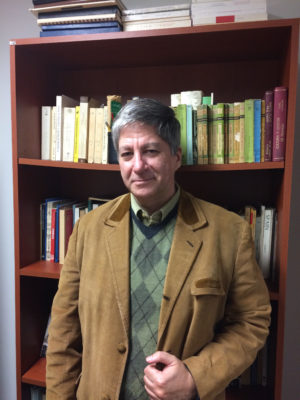
Claudia Salazar Jiménez
Host: Betina Kaplan
Title: “La sangre de la aurora: Violence Against Women and the Latin American Contemporary Novel”
Date: October 6, 2017
Claudia Salazar Jiménez was born in Lima in 1976. She studied literature at the Universidad Nacional Mayor de San Marcos and holds a PhD in Latin American Literature from NYU. She is the editor of two anthologies, Voces para Lilith (2011), and Escribir en Nueva York. Antología de narradores hispanoamericanos (2014). Her short fiction has been published in several anthologies and journals. In 2013, she published her first novel, La sangre de la aurora, which was awarded the prestigious Premio Las Américas in 2014. She currently lives in New York City.
Her lecture will be followed by a Bilingual reading from La sangre de la aurora/Blood of the Dawn (2013).
Her visit is co-sponsored by the department of Romance languages and the Spanish Language Community at Mary Lyndon Hall.
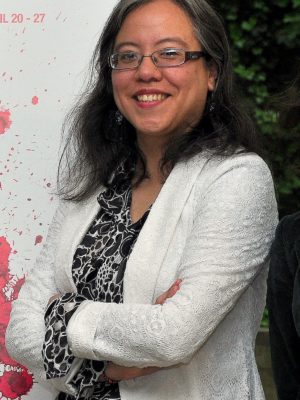
Kofi Agawu
Host: Jean Kidula
Title: “Iconicity in African Musical Thought and Expression”
Date: October 5, 2017
Kofi Agawu, Princeton University Hughes-Rogers Professor of Music, will present a colloquium lecture on “Iconicity in African Musical Thought and Expression.”
The event was hosted by the Hugh Hodgson School of Music, the African Studies Institute and the Musicology/Ethnomusicology Student Association, and sponsored by the Willson Center.
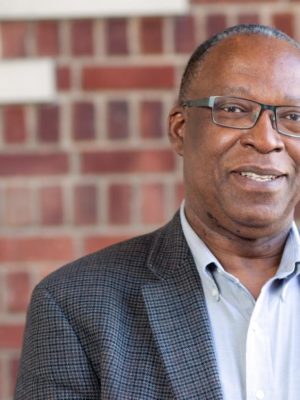
2016 – 2017
Shifra Armon
Host: Elizabeth Wright (Romance Languages)
Title: “War as Spectacle in Miguel de Cervantes’ Siege Play La Numancia”
Date: November 14, 2016
Shifra Armon, Professor of Spanish Literature at the University of Florida, spoke on “War as Spectacle in Miguel de Cervantes’ Siege Play La Numancia.” Her books include Masculine Virtue in Early Modern Spain (2015), and Picking Wedlock: Women and the Courtship Novel in Early Modern Spain (2002). Armon has published articles on a range of topics, including manuals of courtesy, money and coinage, antisemitism in early-modern Spanish letters, and theater and theatricality.
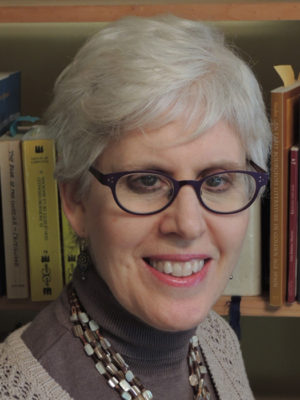
William Cheng
Host: Susan Thomas (Hugh Hodsgon School of Music)
Title: “Aesthetics as Eugenics”
Date: April 18, 2017
William Cheng, Assistant Professor of Music at Dartmouth College, spoke on “Aesthetics as Eugenics” in the Hugh Hodgson School of Music. Cheng, a music, media and ethics scholar, is author of Just Vibrations: The Purpose of Sounding Good (2016) and Sound Play: Video Games and the Musical Imagination (2014). The event, funded by a Distinguished Lecturer grant from the Willson Center for Humanities and Arts and hosted by the Hodgson School’s Musicology/Ethnomusicology Student Association, explored how judgements of others’ musical and artistic abilities and disabilities can affect social justice and progress.
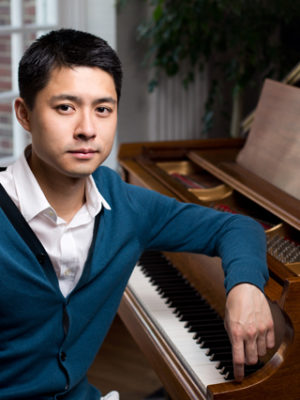
Marie-Hélène Huet
Host: Francis Assaf and Mark Anderson (Romance Languages)
Title: “From Plague to Cholera: Enlightenment and Civic Responsibility”
Date: March 17, 2017
Marie-Hélène Huet, the M. Taylor Pyne Professor of French at Princeton University, spoke on “From Plague to Cholera: Enlightenment and Civic Responsibility.” Huet has written extensively on cultural history, historiography, 18th- and 19th-century literature, and the French Enlightenment. Her most recent book is The Culture of Disaster (2013). Her earlier books include Monstrous Imagination (1993), which was awarded the Harry Levin Prize in Comparative Literature, and Mourning Glory: The Will of the French Revolution (1997).
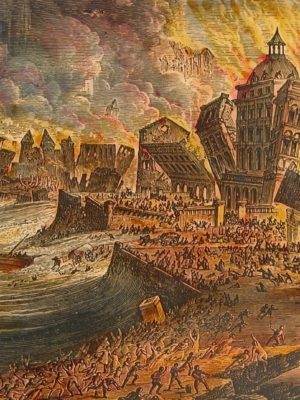
Heather Thompson and Keeanga-Yamahtta Taylor
Host: Jamie Kreiner (History)
Title: “From Attica to Ferguson: Race and the Criminal Justice System”
Date: February 13, 2017
Keeanga-Yamahtta Taylor, Assistant Professor in the Department of African America Studies at Princeton University, and Heather Thompson, Professor of History in the Department of Afro-American and African Studies, the Residential College, and the Department of History at the University of Michigan, participated in at discussion on “From Attica to Ferguson: Race and the Criminal Justice System.” Taylor is author of From #BlackLivesMatter to Black Liberation (2016). Heather Thompson is author of Blood in the Water: The Attica Prison Uprising of 1971 and Its Legacy (forthcoming). The event was sponsored by the Departments of History, Sociology, and Political Science, the Willson Center for Humanities and Arts, and the Institute for African American Studies.
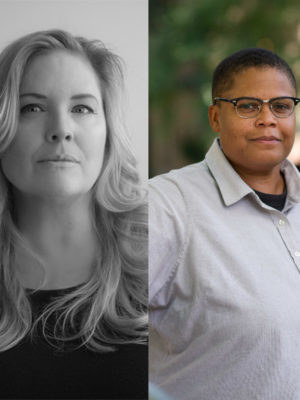
Jeffrey Rich
Host: Michael Marshall (Lamar Dodd School of Art)
Title: “Watershed”
Date: October 6, 2016
Visual artist Jeff Rich explores the complex intersections of ecology, politics, economics, recreation and the dynamic impacts of contemporary culture on the environment in his work, Watershed. His photographic research builds a poetic visual narrative that documents the effects of development and exploitation within the rich Southern landscape. His project Watershed: A Survey of The French Broad River was awarded the 2010 Critical Mass Book Award, and was published as a monograph in 2012. His work has been featured in Fraction Magazine and Photo-Eye Photographer’s Showcase. His ongoing research includes work on the largest watershed in North America along the Mississippi River, as well as a project on the city of Erwin, Tennessee, home to Nuclear Fuel Services – a company processing used radioactive uranium and plutonium with a history of accidents and spills. Rich’s talk at UGA was sponsored by the Lamar Dodd School of Art, Watershed UGA, the UGA Office of Sustainability, the Georgia Museum of Art, and the Willson Center.

Gilbert Laumord
Host: Emily Sahakian (Theatre and Film Studies, Romance Languages)
Title: Residency
Date: February 8-19, 2017
Gilbert Laumord, a Guadeloupean actor and artistic director of the internationally renowned SIYAJ theater company, was in residence at UGA during February 8-19. Lamourd’s artistic work is devoted to the African-derived oral cultures and performance forms of the multilingual Caribbean. In 2008 he received the prestigious Mackandal Award, given by the Cuban Ministry of Culture, for his contributions to Caribbean cultural production. Tale of Black Histories is a 1971 avant-garde Caribbean play created to teach Caribbeans their local histories and culture, excluded from colonial education, and to link their stories with historical heroes, literature, and experiences from across the African diaspora and postcolonial world. The Department of Theatre & Film Studies hosted a symposium about the play and a staged reading of the first translation from the French, by Andrew Daily and Emily Sahakian. The performance was directed by Laumord. Laumord’s residency was sponsored by the Department of Theatre & Film Studies, the Willson Center, the Franklin College Visiting Scholar program, the Latin American and Caribbean Studies Institute, the Department of Romance Languages, the African Studies Institute, and the Institute for African American Studies.
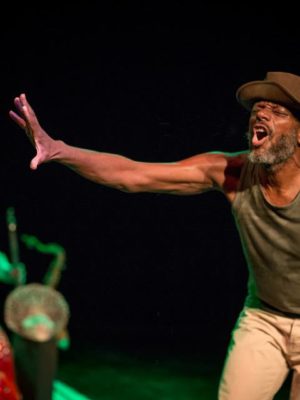
Craig Hella Johnson
Host: Jason Burnett (Hugh Hodgson School of Music)
Title: “Considering Mathew Shepard”
Date: March 17, 2017
Grammy-winning conductor and Artistic Director of Conspirare, Craig Hella Johnson visited the Hugh Hodgson School of Music and led the Hodgson Singers and Men’s and Women’s Glee Clubs in a performance of his own composition, Considering Matthew Shepard. Considering Matthew Shepard, a fusion passion oratorio, is a 100-minute musical response to the tragic murder of Matthew Shepard in Laramie, Wyoming in October of 1998. In the oratorio, short spoken recitations relate the facts of the event. The musical work blends styles (both traditional and contemporary) in solos and choruses that reflect on the tragedy from several points of view including Shepard’s parents, an angry mob, and the environmental surroundings. Johnson’s multiple movement piece features music in the blues, country, pop, musical theatre, gospel, art song, and traditional western choral tradition.
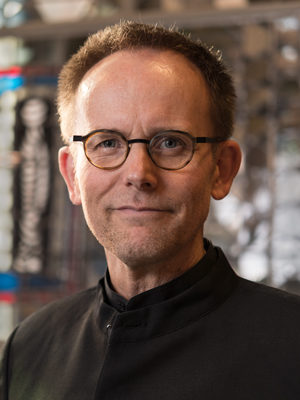
James Chandler
Host: Nell Andrew (Lamar Dodd School of Art)
Title: “The Opium Connection: Thomas De Quincey, Charles Dickens, and D.W. Griffith”
Date: March 17, 2017
The Georgia Colloquium in 18th-and 19th-Century British Literature and the UGA Interdisciplinary Modernism/s Workshop presented a seminar on “The Opium Connection: Thomas De Quincey, Charles Dickens, and D.W. Griffith” with James Chandler, Barbara E. and Richard J. Franke Distinguished Service Professor in the departments of English, cinema, and media studies and Director of the Franke Institute for the Humanities at the University of Chicago. Chandler’s research spans from the Enlightenment to the present, in literature, film, moral philosophy, and cultural studies. He has published on topics from Seamus Heaney to Wordsworth, Irish historical cinema, melodrama, contemporary Irish-American poetry, the sentimental as an aesthetic category in literature and film, and the question of public humanities.
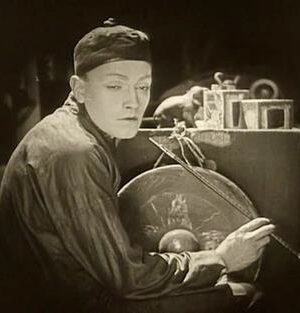
Neal Lester
Host: Kim Waters
Title: Short-term Visiting Fellow
Date: Sept. 13-17 2016
North Georgia’s own Neal Lester is the Founding Director of Arizona State University’s award-winning initiative Project Humanities, as well as holding the titles of Foundation Professor of English, Dean’s Distinguished Professor of English, Parents Association Professor of the Year, and Arizona Humanities Council Distinguished Public Scholar. His research interests include African American literature and culture: children’s literature, folklore and popular culture, black/white interracial intimacies in American culture, African American women writers, black masculinities, the N-word, and the gender and race politics of hair.
Lester has published on such subjects as Disney representations of female characters, black masculinities, and authors such as Zora Neale Hurston, Alice Walker, Toni Morrison, Sapphire, and Ntozake Shange. Lester is the first African American to earn a PhD in English from Vanderbilt University.
His visit to UGA is sponsored by the Willson Center, DIG Fellowship, the department of English, the Linguistics Society at UGA, the Graduate School, the Linguistics Program, the Creative Writing Program, the Georgia Chapter of the NAACP, the Special Collections Libraries, the Grady College of Journalism, the Panhellenic Council, and the Economic Justice Coalition of Athens, with special thanks to Drs. Barbara McCaskill and John Lowe, department of English, and Dr. Francys Johnson, State President, Georgia NAACP.
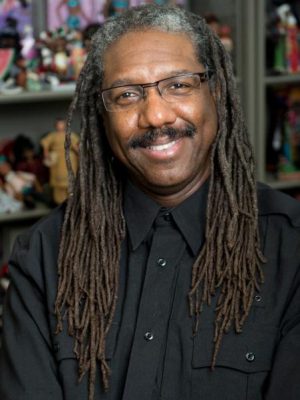
Haun Saussy
Host: Yuanfei Wang
Title: “The Only Game in Town: Early Buddhist Translations Into Chinese”
Date: Sept. 15 2016 @ 5:00pm, Miller Learning Center, Room 248
Haun Saussy is University Professor at the University of Chicago, teaching in the departments of comparative literature and East Asian languages as well as the Committee on Social Thought. His work uses a comparative perspective to interrogate literary texts from premodern China, ancient Greece and Rome, and modern Europe, with a particular leaning toward poetry and poetics. His books include The Problem of a Chinese Aesthetic (1993), Great Walls of Discourse (2001), The Ethnography of Rhythm (2016), and edited collections such asComparative Literature in an Age of Globalization (2006), The Chinese Written Character as a Medium of Poetry: A Critical Edition (2008), and the recent translation of writings by the sixteenth-century Chinese iconoclast Li Zhi, A Book to Burn and a Book to Keep (Hidden) (with Rivi Handler-Spitz and Pauline Lee, 2016). Other activities of his include participating in the design of public artworks with Mel Chin and co-editing the journals CLEAR and Critical Inquiry.
The talk examines the earliest translations of Buddhist doctrine into Chinese, apparently by teams of translators working with second-hand sources. These texts show attention to the contexts of reception— in other words the cultural situation into which Buddhist ideas would be integrated.
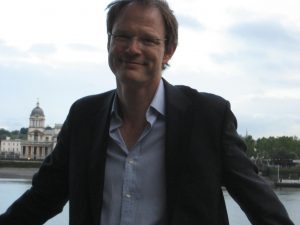
Eva Brann
Host: Edward C. Halper
Title: “Depth versus Complexity”
Date: Sept. 16 2016 @ 3:30pm, Peabody Hall Room 250S
Eva Brann is Dean Emeritus of St. John’s College, a distinguished philosopher and an extraordinary scholar. At the end of next year she will have been on the faculty at St. John’s College in Annapolis, Md. for half a century. During seven of those years she served as the College’s Dean, but otherwise she has been a “tutor.” St. John’s is famous for its Great Books program, and its faculty work through all these texts with the same students over a period of four years. At a result, Brann has a range of knowledge that few academics can approach.
This range is apparent in some of the subjects of some of her fourteen books: ancient Greek pottery, Abraham Lincoln, time, Homer, Herodotus, Imagination, Emotion, Plato, Education in a Republic, Non-Being, Heraclitus, the faculty of the will. She has also translated Jacob Klein’s book on the history of mathematics from the German original, and translated several Platonic dialogue from Greek. In her book on the emotions, Brann has chapters discussing Plato, Aristotle, the Stoics, Aquinas, Descartes, Spinoza, Adam Smith, Hume, Kierkegaard, and Heidegger, and she also includes a chapter on contemporary studies on the brain. Reviewing this book, Susan Shell (Boston College) wrote: “To read Feeling Our Feelings is to relive one’s own early moments of intellectual awakening, with the all the advantages of age and experience. Eva Brann proves to be a most steady and enlightening guide on an inquiry into the relation between life and thought that few have pursued so thoroughly.”
Similar remarks could be made about her other books: Brann has a fresh and engaging perspective on all these subjects. At a time when philosophers are increasingly specialized and disconnected from the big questions, Brann is a generalist. Instead of focusing on the scholarship, she considers central issues and key texts anew. Her method makes her work accessible to a broad audience. Brann’s intellectual contributions were formally recognized when she received the National Humanities Medal (2005). Her ability to focus on key issues in an accessible way is apparent in a 2015 newspaper article.
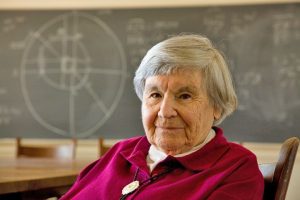
Su Friedrich
Host: Rachel Gabara
Title: Screening of her films First Comes Love (1991, 20 min.) and Gut Renovation (2012, 80 min.)
Date: Oct 11, 2016 @ 4:00pm
Su Friedrich will present a screening of her films First Comes Love (1991, 20 min.) and Gut Renovation (2012, 80 min.). She will introduce the films and answer audience questions following the screening.
The Institute for Women’s Studies Library (Gilbert Hall, Lumpkin Street Entrance) will host a discussion and brunch reception with Friedrich from 8:30-10 a.m. Wednesday, October 12.
Friedrich is Professor of Visual Arts at Princeton University. She has produced and directed twenty-three 16mm films and digital videos since 1978, including Queen Takes Pawn (2013), Gut Renovation(2012), From the Ground Up (2007), The Odds of Recovery (2002), Hide and Seek (1996), First Comes Love(1991), Sink or Swim (1990), Damned If You Don’t (1987), and The Ties That Bind (1984). She is the writer, director, cinematographer, sound recordist, and editor of all but one of her films. In 2015, Friedrich’s autobiographical documentary Sink or Swim was added to the National Film Registry at the Library of Congress.
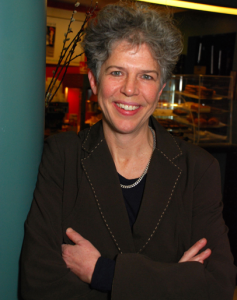
Jonathan Beecher Field
Title: “The Ordering of Towns: Exceptional Abstractions on the New England Frontier”
Date: Oct 19, 2016 @ 3:30pm
Jonathan Beecher Field is an associate professor in the department of English at Clemson University.
There are few social formations from early America as beloved as the New England town. It can represent nostalgic innocence, often represented by departures from innocence like The Scarlet Letter or Peyton Place. At the same time, the New England town persists as a template for a fantasy of idealized democracy, embodied in the New England town meeting. One vestige of this fantasy is the ritual of the dozen or so citizens of Dixville Notch, NH, exercising their privilege to cast the first votes for the President of the United States each election cycle. There is, it appears, something special about this small town in New Hampshire that makes it an exceptionally pure manifestation of democracy.
The 17th century Puritan founders of these New England towns did not treat the form with the same regard it enjoys today. Texts like John Winthrop’s “Essay on the Ordering of Towns,” and Edward Johnson’s Wonder-Working Providence suggest that these settlers were not at all about the formation of towns, and conceived of them as abstract structures intended to occupy the wilderness and displace Indians. In “The Ordering of Towns,” Winthrop conjures not a city on a hill, but a grid of nameless, abstract towns, extending indefinitely toward the horizon.
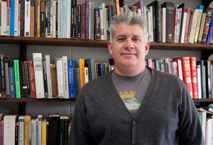
Dana Walrath
Host: Lynn Bustle
Title: “Comics, Medicine, and Healing through Story”
Date: Oct 26, 2016 @ 5:00pm, Lamar Dodd School of Art, Room S151
Dana Walrath, a writer, artist and anthropologist, likes to cross borders and disciplines with her work. After years of using stories and art to teach medical students at University of Vermont’s College of Medicine, she spent 2012-2013 as a Fulbright Scholar in Armenia where she completed her first book, Like Water on Stone, a verse novel about the Armenian genocide of 1915. Loosely based on the story of her grandmother, Like Water on Stone is a Notable Book for a Global Society award winner, a Bank Street Best Book of 2015, a Vermont Book Award finalist, and more.
Her just-released graphic memoir, Aliceheimer’s, about life with her mother, Alice, before and during dementia, has been featured in The New York Times, the Los Angeles Review of Books andThe Philadelphia Inquirer. She has spoken extensively about the role of comics in healing throughout North America and Eurasia including two TEDx talks. She has also shown her artwork in a variety of venues throughout North America and Eurasia.
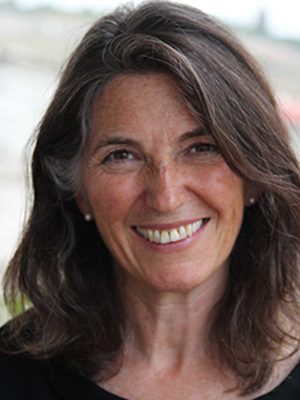
Kimiko Hahn
Host: Melisa Cahnmann-Taylor
Title: Poetry Reading
Date: Nov 1, 2016 @ 2:00pm, Georgia Museum of Art, M. Smith Auditorium
Kimiko Hahn, the author of eight collections of poetry, will read from her most recent collection, “Toxic Flower” (W.W. Norton, 2010), illustrating connections between scientific study and poetry. The Southeast Consul General of Japan will provide introductory remarks on “Tradition and Poetry in Japan: Tanka and the Imperial Family.” The reading concludes the NEA Big-Read “Poe-Tober” in Athens.
This event is co-sponsored by the Georgia Museum of Art, the departments of genetics and plant biology, Athletic Association Professor Julie Luft, the Center for Asian Studies, the Japanese Consulate in Atlanta, and the Willson Center, in partnership with Dr. Melisa Cahnmann-Taylor of Language and Literacy Education and “Poe-Tober” in Athens.
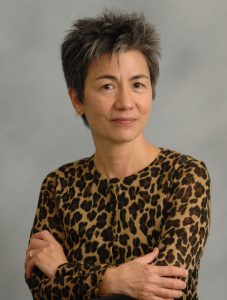
Karla Mallette
Host: Paola De Santo
Title: “Life Writing: Lingua Franca and Cosmopolitan Languages in the Mediterranean”
Date: Nov 4, 2016 @ 4:00pm, Gilbert Hall, Room 118
Karla Mallette is a scholar of medieval Mediterranean literature, with an emphasis on contacts between Italy and the Arab world. She is the author of The Kingdom of Sicily, 1100-1250: A Literary History (University of Pennsylvania Press, 2005) and European Modernity and the Arab Mediterranean: Toward a New Philology and a Counter-Orientalism (University of Pennsylvania Press, 2010), and co-editor of A Sea of Languages: Rethinking the Arabic Role in Medieval Literary History (University of Toronto Press, 2013). She is currently working on a comparative study of the two great cosmopolitan languages of the medieval Mediterranean, Latin and Arabic, entitled Lives of the Great Languages. She is Professor of Italian and Near Eastern Languages and Director of the Islamic Studies Program at the University of Michigan.
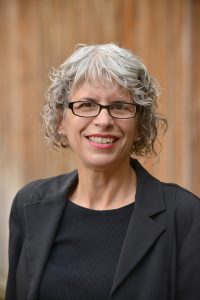
Fortunato Ensemble, Fortunato (voice), Bloom (flute), Rupert (piano)
Host: Peter Van Sandt Lane
Title: Performance
Date: Nov 3, 2016 @ 6:00pm, Ramsey Concert Hall
D’Anna Fortunato, mezzo-soprano; Peter H. Bloom, multiple flutes; and Mary Jane Rupert, piano, have concertized together for more than 20 years and have toured as a vocal chamber ensemble across the United States. The Fortunato Ensemble will make its debut at the UGA Hugh Hodgson School of Music with a Gala Vocal Chamber Concert, featuring the premiere of a new work written for the occasion by UGA Professor Adrian P. Childs. Other selections will include duets by J.S. Bach and Felix Mendelssohn (with UGA Professor Stephanie Tingler, soprano, joining the ensemble), and music by Mozart, Schubert, and Elizabeth Vercoe.
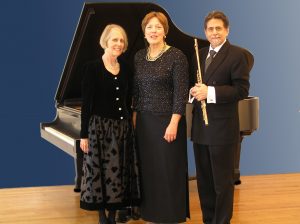
Nicholas Grene
Host: Sujata Iyengar
Title: 1616 / 1916 / 2016: Shakespeare in Ireland Symposium – Nicholas Grene lecture: “Irish Shakespeares: 1916 to 2016”
Date: Nov 9, 2016 @ 4:00pm, Richard B. Russell Building Special Collections Libraries
Nicholas Grene is Emeritus Professor of English Literature at Trinity College Dublin, where he taught for 36 years.
His talk, “Irish Shakespeares: 1916 to 2016,” recounts the uneasy history of Irish Shakespeares from 1916 to 2016. In April 1916 the British Empire Shakespeare Society staged Hamlet as part of the Shakespeare Tercentenary celebrations. In the period since 1922, Shakespeare, the canonical writer of the former colonial power, has been an uneasy presence in Irish theatre. For many years, Anew McMaster continued the tradition of touring the plays round Ireland, initially with those pretend Irishmen Hilton Edwards and Micheal Mac Liammóir in his company. An adventurously modernist King Lear was staged at the Abbey in 1928, directed by the playwright Denis Johnston. There have been some successful productions of the comedies with a specifically Irish dimension, such as the 1990s musical Comedy of Errors, or the 2006 Taming of the Shrew given a contemporary Irish setting. But many Irish productions have struggled to find an appropriate idiom for Shakespeare. Nicholas Grene’s paper will explore a range of Irish stagings of the plays down to the award-winning DruidShakespeare of 2015 and the Abbey’s 2016 production of Othello.
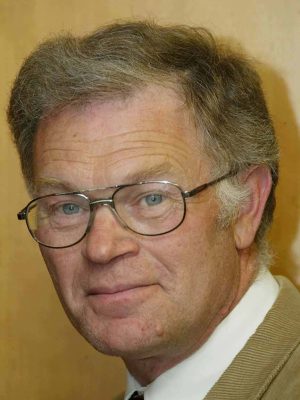
2015 – 2016
Meredith Martin
Host: Chloe Wigston-Smith
Title: “Feminine Endings: Women’s Metrics from Meynell to Moore”
Date: June 3, 2016
This lecture examines the metrically innovative poetry of late 19th and early 20th-century women poets as a counter-argument to a literary historical account of modernism that casts women’s poetry as auxiliary to or derivative of the complicated masculinity of modernism. Dr. Martin seeks to expand and enrich our notion of modernist metrics by considering poetry and critical writing by Alice Meynell, Elizabeth Daryush, Adelaide Crapsey, and Marianne Moore to ask how and why women led the way in the move from accentual to syllabic verse form.
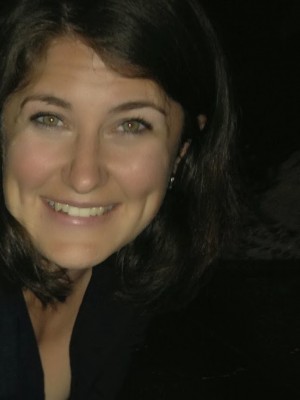
Frances Whitehead
Host: Georgia Strange
Title: “From Fine Art Practice to Public Engagement: New Pathways for Artistic Practice”
Date: March 22, 2016
Frances Whitehead is a civic practice artist bringing the methods, mindsets, and strategies of contemporary art practice to the process of shaping the future city. Questions of participation, sustainability, and culture change animate her work as she considers the surrounding community, the landscape, and the interdependency of multiple ecologies in the post-industrial city. Connecting emerging art practices, the discourses around culturally informed sustainability, and new concepts of heritage and remediation, Whitehead’s cutting-edge work traverses disciplines to engage with engineers, scientists, and landscape architects, to hybridize art, design, science, and civic engagement, for the public good. Whitehead is Professor of Sculpture + Architecture at the School of the Art Institute of Chicago.
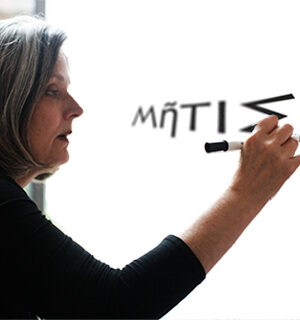
Alexa Huang
Host: Sujata Iyengar
Title: “Others Within: Ethics in the Age of Global Shakespeare”
Date: November 12, 2015
Shakespearean performance and criticism as a global industry connotes geo-political power and soft power that is manifested in cultural diplomacy. What does it entail to quote from an artwork? In the age of global Shakespeare, quotation can be a gesture of deferral or a demarcated space for reflection. Evoking Shakespeare creates a visually and rhetorically marked space, a rupture between contemporary artists’ works and Shakespeare’s words. Performing Shakespeare in worldwide languages and styles is a process of incorporating multiple voices into one artwork. It is a tug of wars between competing voices across time and space.
Alexa Huang teaches in the English Department at George Washington University in Washington, D.C., where she is founding co-director of the Digital Humanities Institute and director of the Dean’s Scholars in Shakespeare program. She has received the Modern Language Association’s Scaglione Prize for Comparative Literary Studies. She is founding Co-Director of the Global Shakespeare Video and Performance Archive, and was Fulbright Distinguished Chair at Queen Mary University of London and University of Warwick, 2014-2015. Her work focuses on explaining the mobility of early modern and postmodern cultures in their literary, performative, and digital forms of expression.
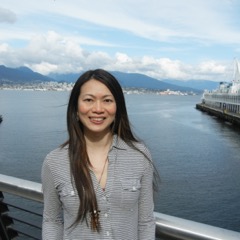
Langdon Hammer
Host: Aiden Wasley (English)
Title: “The Biographical Container: James Merrill’s Life and Art”
Date: November 10, 2015, 4:30pm
Location: MLC room 350
Langdon Hammer is Professor and Chair of the Department of English at Yale University. One of the most distinguished scholars and critics of modern and contemporary poetry in America, he is a regular reviewer of poetry for The New York Times, poetry editor of The American Scholar, and frequent contributor to journals such as Raritan, American Literary History, Parnassus, and the Yale Review. He has published and edited numerous books, including Hart Crane and Allen Tate; Janus-Faced Modernism (Princeton), Hart Crane: The Complete Poetry and Selected Letters (Library of America), and The Collected Poems of May Swenson (Library of America). He has lectured widely on American poetry at Oxford, Harvard, Princeton, the 92nd Street Y, and many other places, and his popular Yale course on modern poetry has been seen around the world through the Open Yale free online video program, and has been featured in the New York Times and the Chronicle of Higher Education. He has been a judge for the Bollingen Prize, a Guggenheim and Bogliasco Fellow. His latest book, and the topic of his lecture, is James Merrill: Life and Art (Knopf), an acclaimed 900-page biography of Merrill, the first significant critical biography to take full stock of the life and work of this major postwar American poet.
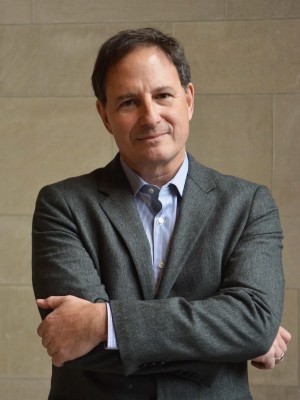
Dr. James P Lantolf
Host: Victoria Hasko (Language and Literacy Ed.)
Title: “Sociocultural Psychology and the Pedagogical Imperative: L2 Developmental Education”
Date: October 29, 2015, 3:30pm
Location: GA Museum of Art Auditorium
In communicative language teaching, the assumption is that language acquisition would take place if we provided learners with simplified comprehensible input (Krashen) or engaged learners in tasks where they had to negotiate meaning (Long). The assumption is that if learners could understand the input the “natural psychological” processes that guide acquisition in the everyday world, they would operate just as well in the educational setting. In this presentation I will argue that assuming language acquisition guided by “natural psychological processes” is the same no matter where or when is problematic. Instead, language development as it occurs in educational settings is a different process from what transpires in everyday immersion settings. Vygotsky conceived education as a special kind of developmental process whereby learners encounter the object of study under “artificial” circumstances where intentional and well-organized instruction results in development that differs from what occurs in the everyday world. Accordingly, education provokes development through explicit systematic understanding of the object of study, including second languages. Our task is to make this knowledge available to learners in a systematic and pedagogically useful way and to help them make the connection between this knowledge and their own practical activity. I will consider four studies carried out in accordance with Vygotsky’s educational principles: the first focuses on the development of English verb-noun collocations with make, take, do, get, and have; the second deals with English phrasal verbs such as look up, spread out; the third instructs learners how to detect and interpret sarcasm, a pervasive feature of everyday spoken English; the fourth is an approach to teaching L2 reading through a division-of-labor pedagogy.
James P. Lantolf is the Greer Professor in Language Acquisition and Applied Linguistics in the Department of Applied Linguistics at Penn State University. He is Director of the Center for Language Acquisition and of CALPER (Center for Advanced Language Proficiency Education and Research), a U.S. Department of Education, Title VI Language Resource Center. He was president of the American Association for Applied Linguistics (2005), served as coeditor of Applied Linguistics (1993-1998), and is founding editor of Language and Sociocultural Theory. He is recipient of the AAAL Distinguished Scholarship and Service Award for 2015-2016. He is renowned internationally for bringing into focus research highlighting the primacy of cultural, historical, and social aspects of second language development, in opposition to the dominant views on the innateness and biological bases of human language. He is co-author of Sociocultural Theory and the Genesis of Second Language Development (2006), Oxford University Press, and Sociocultural Theory and the Pedagogical Imperative: Vygotskian Praxis and the L2 Research/Practice Divide (2014), Routledge. He edited Sociocultural Theory and Second Language Learning (2000), Oxford University Press, and Vygotskian Approaches to Second Language Research (1994), Ablex Press, and Sociocultural Theory and the Teaching of Second Languages (2008), Equinox Press. He is in the process of co-editing The Routledge Handbook of Sociocultural Theory and Second Language Development. He holds honorary professorships at the University of Hong Kong and Xi’an JiaoTong University in China. He is a beloved and respected mentor for an extensive network of scholars working in the L2 sociocultural paradigm across the world.
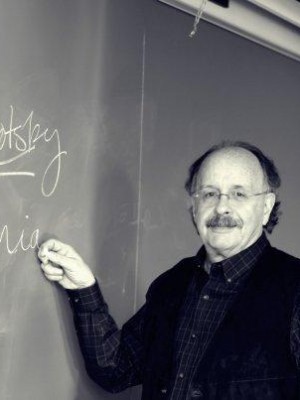
Monirah Hashemi
Host: David Zucker Saltz (Theatre)
Title: “Sitaraha — The Stars”
Date: August 27, 2015, 8:00 pm
Location: Fine Arts Building, Cellar Theater
Monirah Hashemi will present her solo performance Sitaraha — The Stars, directed by Lief Persson, in the Cellar Theater of the Fine Arts Building on Thursday, August 27 at 8pm. In this powerful piece, she enacts the narratives of a series of Afghan women throughout history, including Gul Begum, a woman who has lost her family and was enslaved in 1892, Sara, who has witnessed civil war, and Halima, who has been charged with having an extra-marital relationship and is awaiting death-by-stoning
Read more
Hashemi was born in Iran in 1985. At the age of nineteen she moved to Herat, Afghanistan and started working as a film actress. She and Abdul Hakim Hashemi established the Simorgh Film Association of Culture and Art (SFACA) in 2005. She has since acted in numerous short films. She wrote and directed the short films In the Embrace of Wind and Last Laugh. In 2007 she won the best director award at the First Educational Theatre Festival for her work on the play Cry Of History. She staged Babur Shah Garden for the Fourth Afghan National Theatre Festival in Kabul and Cry Of History for the International Theatre Festival Of National School Of Drama (NSD) in India, and co-directed the play Burka Bondage with the Helena Waldmann in Berlin. She also wrote, directed and performed in Masks under Burka, which was presented at the Thirteenth Black Sea International Theater Festival in Trabzon, Turkey and the International Women’s Playwright Conference in Stockholm.
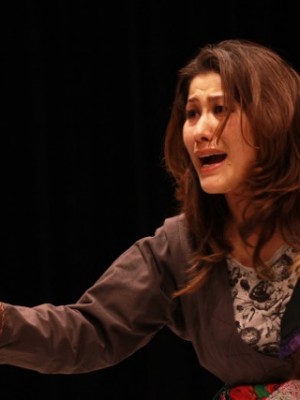
2014 – 2015
John Carlos Rowe
Host: Peter O’Neill (Comparative Literature)
Title: “The Ends of Transnationalism and U.S. Cultural Imperialism”
Date: October 3, 2014, 1:30 pm
Location: Richard B. Russell Special Collections Libraries Auditorium
John Carlos Rowe is USC Associates’ Professor of the Humanities and Professor of English and American Studies and Ethnicity at the University of Southern California, where he has served as Chair of the Department of American Studies and Ethnicity (2008-2011). He was Professor of English and Comparative Literature at the University of California, Irvine from 1975-2004, where he was a founding member of the Critical Theory Institute.
Read more
The transnational study of U.S. and other American cultures has been the prevailing method and paradigm for American Studies and American Literature for the past two decades. In recent years, however, some scholars have questioned the relevance of the term “transnational” and its theoretical applicability to the “global” and “planetary” scope of the U.S. state. Robyn Wiegman contends in Object Lessons that the transnational approach is an inherently flawed effort to avoid our intellectual complicity in U.S. imperialism. Still other scholars have identified forms of human mobility and affiliation that are not adequately treated by the category “transnational.”
Are we at the end of the transnational methodology and conceptualization of the U.S. and other Americas? Or are there other purposes served by the transnational approach that have not yet been satisfactorily investigated? What are the currently viable intellectual alternatives to transnational American Studies, and how do they help us avoid or overcome the limitations of the theory?
His books include Henry Adams and Henry James: The Emergence of a Modern Consciousness (Cornell University Press, 1976), At Emerson’s Tomb: The Politics of Classic American Literature (Columbia University Press, 1997), Literary Culture and U.S. Imperialism: From the Revolution to World War II (Oxford University Press, 2000), The New American Studies (University of Minnesota Press, 2002), Afterlives of Modernism: Liberalism, Transnationalism, and Political Critique (Dartmouth College Press of the University Press of New England, 2011), and The Cultural Politics of the New American Studies (Open Humanities Press, 2012), and he is the author of over 150 scholarly essays and critical reviews.
He is the editor of The Vietnam War and American Culture (Columbia University Press, 1991), “Culture” and the Problem of the Disciplines (Columbia University Press, 1998), Post-Nationalist American Studies (University of California Press, 2000), Selections from the Writings of Ralph Waldo Emerson and Margaret Fuller in the New Riverside Editions (Houghton Mifflin, 2003), Re-Framing the Transnational Turn in American Studies (Dartmouth College Press, 2011), and Lindon Barrett’s Blackness and the Discontinuity of Western Modernity (University of Illinois Press, 2014), as well as numerous other volumes.
His current scholarly projects are Our Henry James and The Ends of Transnationalism.
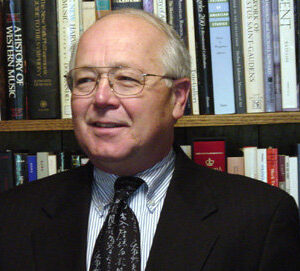
Janice Kerbel
Date: November 4, 5:30pm
Location: Lamar Dodd School of Art, Room S151
Janice Kerbel is a Canadian artist living in London, UK. She is known for carefully constructed and highly detailed works that fuse the real and imaginary. Her work ranges from radio plays to print-based works to performances of sound and light. Consistently experimenting with forms that both suggest and defy the visual, Kerbel’s work has explored subjects including plant life, the supernatural, romance, baseball, and most recently music.
Read More
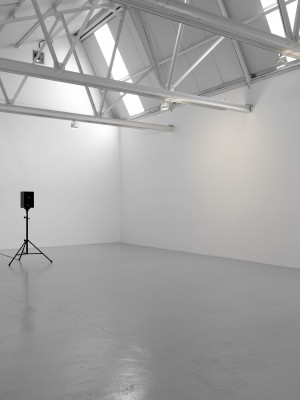
Steven Nadler
Title: “How To Do the Right Thing: Act and Motive in Spinoza’s Moral Philosophy”
Date: November 7, 3:30pm
Location: Peabody Hall
Steven Nadler’s visit is part of the Department of Philosophy’s Kleiner Colloquium Series, which features renowned scholars speaking on a wide variety of philosophical topics, and the Wilson Center’s Distinguished Artist or Lecturer program. He is the William H. Hay II Professor of Philosophy from the University of Wisconsin.
Read More
In his philosophical masterpiece, the Ethics, Spinoza has much to say about virtue, reason, and happiness, all standard topics in moral philosophy. He is also committed to a thoroughgoing egoism when it comes to motivation. All human action derives from a striving to preserve one’s being and maximize one’s power. While Spinoza eschews moral evaluations of actions in terms of ‘right’ and ‘wrong’, he nonetheless believes that there are certain normative ways of assessing actions, according to the degree to which they do in fact contribute to the agent’s egoistic striving. Thus, it would seem to follow that an agent’s motives play no role in the assessment of the action, nor even in the assessment of the agent him/herself — primarily because all agents would seem to have one and the same basic motive: self-interest. Still, is there any room in Spinoza’s thought for discriminating “better” or “worse” motives, and for taking these into account when assessing actions from a moral perspective?
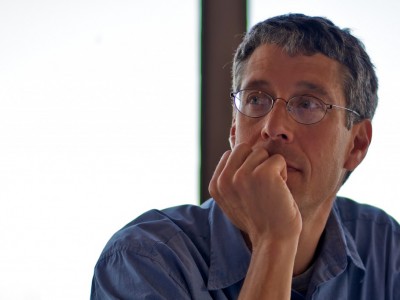
Barry McGovern
Title: Performances from Samuel Beckett
Date: November 10, 8pm
Location: Ciné
Barry McGovern (born 1948) is an Irish stage, film and television actor. He will give a performance of the poetry and prose of Samuel Beckett in a special appearance sponsored by the Consulate General of Ireland in Atlanta.
McGovern is a former member of the RTÉ Players and the Abbey Theatre Company. He has worked in theatre, film, radio and television, as well as written music for many shows, and co-written two musicals and directed plays and operas. He is known internationally for his award-winning one-man Beckett showsI’ll Go On and Watt, which the Gate Theatre presented at the 1985 and 2010 Dublin Theatre Festival, respectively. McGovern revived I’ll Go On for a run at the Kirk Douglas Theatre in Culver City, CA for the Center Theatre Group in 2014.
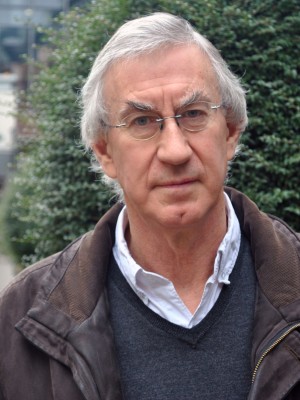
Peter Fallon
Title: Poetry Reading
Date: November 18, 2014, 7:30 pm
Location: Ciné
Peter Fallon was born in Germany in 1951 and grew up on his uncle’s farm near Kells in County Meath. He is an Honours Graduate of Trinity College, Dublin, where, in 1994, he was Writer in Residence. At the age of 18 he founded The Gallery Press, which has published more than 400 books of poems and plays by Ireland’s finest established and emerging authors and which is recognized as the country’s pre-eminent literary publishing house.
Read more
Fallon has given readings all over the U.S., in Europe, Canada, and Japan. In 1990 he edited, with Derek Mahon, the best-selling anthology The Penguin Book of Contemporary Irish Poetry. His selected poems, News of the World, was published by Wake Forest University Press in 1993. An expanded edition was published in Ireland in 1998 and was included in The Irish Times “Books of the Year.”
The Georgics of Virgil, (a Poetry Book Society Recommended Translation), was published in September 2004. A dramatization of Tarry Flynn, the novel by Patrick Kavanagh, received its first production in Pennsylvania the same month. The Georgics was subsequently published by Oxford in its World’s Classics series. The Company of Horses appeared in 2007 and his latest collection, Strong, My Love was published in 2014.
Fallon received the 1993 O’Shaughnessy Poetry Award from the Irish American Cultural Institute. He has been Poet in Residence at Deerfield Academy in Massachusetts and, in the Spring of 2000, he was the inaugural Heimbold Professor of Irish Studies at Villanova University. In 2003 he was elected to Aosdána. He lives with his family in Loughcrew in County Meath.
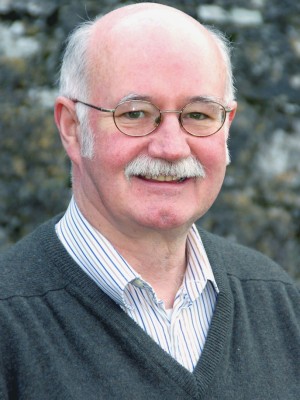
Chris Kraus
Title: “Lost Properties”
Date: January 8, 2015, 5:30 pm
Location: Lamar Dodd School of Art, room S150
Chris Kraus is a Los Angeles based author and filmmaker. She teaches creative writing at UC San Diego and at the European Graduate School. Kraus is well known for her role as an influential film and video maker in the New York Downtown scene of the mid eighties. Since 1990, she has directed the Native Agents new fiction series for the visionary independent press Semitotext(e), publishing such overlooked writers as Kathy Acker, Barbara Berg, Family Howe, and Eileen Myles. In work she has explored a variety of different subjects ranging from feminism, gender politics, sex workers, philosophy and love. Some of her publications include Summer of Hate (2012), David Wojnarowicz: a Definitive History of Five or Six Years on the Lower East Side (2006), LA Artland: Contemporary Art from Los Angeles (2005), Video Green: Los Angeles Art and the Triumph of Nothingness (2004), Aliens and Anorexia (2000), and I Love Dick (1997).
Read more
Written for Semitoext(e)’s contribution to the 2014 Whitney Biennial, Lost Properties discusses the fine line between conceptual art and economic activism. The monograph traces the lives and work of artist Thomas Gokey a co-founder of Rolling Jubilee, the debt forgiveness spectacle that arose from Occupy Wall Street; and the now-defunct West Amsterdam gallery / housing project Lost Properties, founded by artist Felicia von Zweibergk.
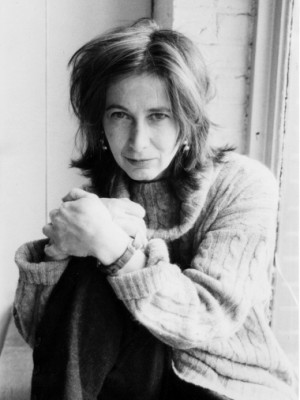
Jerel Hilding
Title: “Ballet Conversations: Jerel Hilding discusses his career with the Joffry Ballet”
Date: January 15, 2015, 11 am
Location: New Dance Theatre
As a principal dancer with the Joffrey Ballet for 15 years, Jerel Hilding performed in works by many of the 20th century’s most influential choreographers, including Balanchine, Arpino, Robbins, Ashton, Cranko, Jooss, Massine, and Tharp. He directed the New Jersey Ballet’s Artist-in-Education program and worked as an instructor for New York’s City Center Theatre Outreach Program. He has taught throughout the country including New York, New Jersey, Arizona, New Orleans, and the Midwest.

Guerrilla Girls
Title: “Not Ready to Make Nice: Guerrilla Girls in the Artworld and Beyond”
Date: February 19, 2015, 5:30 pm
Location: Georgia Museum of Art
“Not Ready to Make Nice” features provocative work by the anonymous Guerrilla Girls artists, a feminist collective famous for combining humor, hard facts and art on street posters, billboards and stickers. Their creations draw attention to the underrepresentation of women artists and artists of color in museums around the world. The exhibition features major works from rarely shown international projects tracking the group’s artistic and activist influence around the globe. The exhibition is organized by in-house curators Lynn Boland, Pierre Daura Curator of European Art, and Sarah Kate Gillespie, curator of American art, in partnership with Neysa Page-Lieberman, curator of “Not Ready to Make Nice: Guerrilla Girls in the Artworld and Beyond,” director and curator of the department of exhibitions, performance and student spaces at Columbia College Chicago.
Read More
The Georgia Museum of Art at the University of Georgia will present the exhibition “Not Ready to Make Nice: Guerrilla Girls in the Artworld and Beyond” December 6 to March 1. On February 19 at 5:30 p.m., there will be a panel discussion sponsored by the Willson Center for Humanities and Arts with curator Neysa Page-Lieberman, Frida Kahlo, founding and current member of the Guerrilla Girls, and Romaine Brooks, former Guerrilla Girl. A reception sponsored by the Institute for Women’s Studies will follow.

Anat Feinberg
Title: “‘Macht kein Theater’: George Tabori and his Theater revisited”
Date: February 26, 2015, 4:30 pm
Location: Russell Special Collections Libraries, room 271
Anat Feinberg is Professor of Hebrew and Jewish Literature at the Hochschule für Jüdische Studien in Heidelberg, Germany. Her research foci are modern Hebrew literature, Jewish literature, theater studies and Israeli studies. Her publications include books on the representation of Jewish fate in postwar German drama, on Jewish musicians in Germany after 1945, on Iraqi-Jewish authors, and on Hungarian-German-Jewish playwright George Tabori (in both English and German). In addition to authoring numerous articles and book chapters and to editing anthologies of Israeli authors, Feinberg served as the editor in charge of two large encyclopedia projects on Modern Hebrew literature. Feinberg’s research has been supported with grants from the German Academic Exchange Council and the German Humboldt Foundation and she has held visiting appointments at the University of Lucerne (Switzerland) and the University of Pennsylvania.
Read More
At the University of Georgia, she will be one of three keynote speakers during a three-day conference entitled George Tabori and the Theatre of the Holocaust. Her talk, “‘Macht kein Theater’: George Tabori and his Theater revisited” aims to reassess Tabori’s legacy in Germany as a playwright and director eight years after his death, probing the influence of an author widely recognized as one of the leading figures in post-war German theatre. George Tabori (1914-2007) took his first steps on the American stage before he returned to Germany and presented German audiences with productions evoking the Holocaust in ever more daring and provocative variations, using the entire gamut of postmodern experimental techniques. “There are taboos that must be broken or they will continue to choke us,” the prodigiously gifted dramatist and director argued.
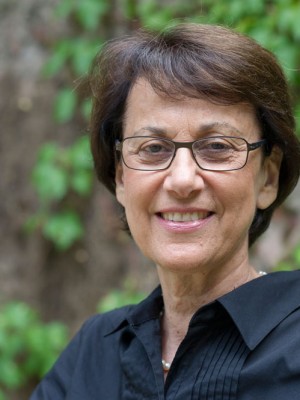
Henry Bial
Title: “The Funny Thing About Jewish Performance Studies”
Date: February 27, 2015, 1:30 pm
Location: Magnolia Ballroom, Georgia Center for Continuing Education
Henry Bial is the Associate Dean for the College of Liberal Arts & Sciences, the Director of the School of the Arts at the University of Kansas, and the President of the Association for Theatre in Higher Education. Dr. Bial is the author of Acting Jewish: Negotiating Ethnicity on the American Stage and Screen (University of Michigan Press, 2005), the editor of The Performance Studies Reader (Routledge, 2004; Second Edition, 2007), and the co-editor of Theater Historiography: Critical Interventions (with Scott Magelssen, University of Michigan Press, 2010) and Brecht Sourcebook (with Carol Martin, Routledge, 2000). He has published essays in TDR, Theatre Topics, The Journal of American Drama and Theatre, and elsewhere. Dr. Henry Bial will give the second of three keynote addresses for the international conference on George Tabori and the Theatre of the Holocaust.
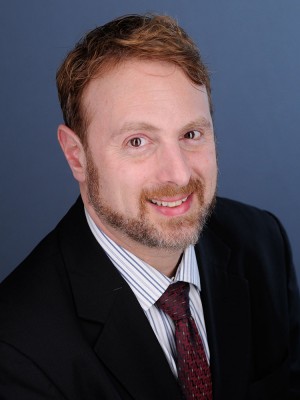
Bradford Skow
Title: “Explanations, Why Questions, Reasons, and Causes”
Date: February 27, 2015, 3:30 pm
Location: Peabody Hall, room 205S
Bradford Skow is Associate Professor of Philosophy at the Massachusetts Institute of Technology. Since the completion of his Ph.D. at New York University in 2005 he has come to be recognized as one of the most original, productive, and influential analytic philosophers of his generation. The scope of his work ranges from the foundations of quantum physics and relativity to the metaphysics of causation and value theory. In his forthcoming book (Objective Becoming, Oxford UP) Skow develops a new and insightful perspective on an ongoing debate in the philosophy of time. His talk at UGA deals with the nature of explanation.
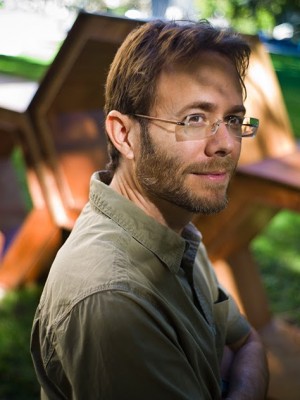
Freddie Rokem
Title: “From Tragedy to Farce”
Date: February 28, 2015, 5:30 pm
Location: Balcony Theatre, Fine Arts Building
Freddie Rokem is the Emanuel Herzikowitz Professor for 19th and 20th Century Art and teaches in the Department of Theatre Studies at Tel Aviv University, where he served as the Dean of the Yolanda and David Katz Faculty of the Arts (2002-2006). He is also a permanent guest Professor (Docent) at Helsinki University, Finland and has been a visiting Professor at Stanford University, the Free University in Berlin, the University of Munich, the University of Stockholm, UC Berkeley and UC Davis. His book Performing History: Theatrical Representations of the Past in Contemporary Theatre (2000) received the ATHE Prize for best theatre studies book in 2001. His other books include Strindberg’s Secret Codes (2004) and Philosophers and Thespians: Thinking Performance (2010). He is co-editor (together with Jeanette Malkin) of Jews and the Making of Modern German Theatre (2010), and was the editor of Theatre Research International from 2006 to 2009. Dr. Freddie Rokem will give the final of three keynote addresses for the international conference on George Tabori and the Theatre of the Holocaust. The title of his talk is “From Tragedy to Farce.” His talk is sponsored by the Willson Center for Arts and Sciences and the UGA State of the Art Conference Grant.
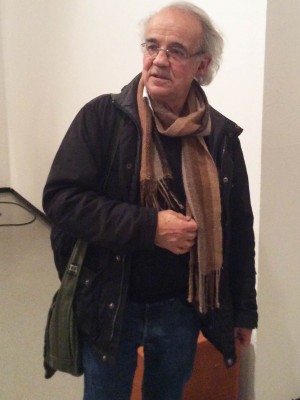
Thomas Pavel
Title: “The Double Look: Actions and Norms in Fiction”
Date: March 27, 2015, 4 pm
Location: Gilbert Hall, room 115
Thomas G. Pavel was born in Bucharest, Romania. Educated in his native country and in France, he pursued an academic career in Canada and the U.S. A lover of literature, he reflected on the nature of fictional worlds, their puzzling distance from the actual world, and their inexhaustible diversity. His recent work The Lives of the Novel (2013) is a reader-friendly history of the novel as a genre, from its Ancient Greek origins to the present. Having taught at the University of Quebec in Montreal, the University of California, Santa Cruz, and Princeton University, he now serves as the Gordon J. Laird Distinguished Service Professor in Comparative Literature, Romance Languages and Literatures, and Social Thought at the University of Chicago. His books, written in English and French, have been translated into Italian, Spanish, Portuguese, Romanian, Czech, and Japanese.
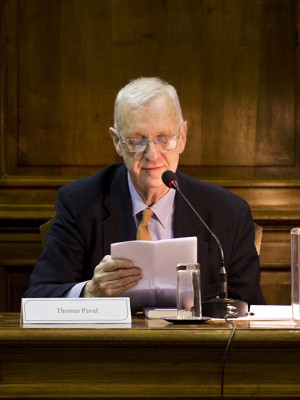
Claudio Benzecry
Title: “How do sweat, tact, and sound get assembled?”
Date: April 10, 2015, 2:30 pm
Location: Miller Learning Center, room 350
Claudio Benzecry is Associate Professor of Sociology at the University of Connecticut and a Fellow at Yale’s Center for Cultural Sociology. His path-breaking book The Opera Fanatic: Ethnography of an Obsession (Chicago University Press, 2011) is an in-depth analysis of what it means to love opera and the subjective process of becoming an opera fan. In 2015 he will be a visiting scholar at NYU’s Institute for Public Knowledge, writing his second full-length manuscript, From Head to Toe: Everyday Globalization in a Creative Industry. The book investigates the relationship between consumers and tastemakers, focusing on the ways in which the making of female shoes link different locales across the globe: New York, Milano, and Dongguan.
Read More
His presentation is entitled “How do sweat, tact, and sound get assembled? Lessons from going to the opera, buying soccer jerseys and following the global shoe.” Based on three ethnographical projects in Buenos Aires, New York and Dongguan, Dr. Benzecry will talk about how objects, the senses, and selfhood become intertwined. The lecture will present the manifold ways in which aesthetic and sensorial judgments are assembled and explore what happens when objects change: how do people make sense of the transformation? What strategies do they use to re-enchant objects perceived as in decay?
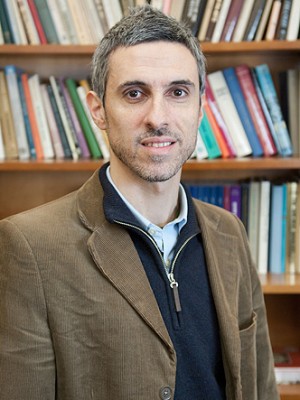
2013 – 2014
John Rist
Host: Ed Halper (Department of Philosophy)
Title: “Can Augustine’s ‘City of God’ Help Us Deconstruct Multiculturalism?”
Date: August 26, 3:30 pm
Location: Peabody Hall, 205S
John Rist is Professor Emeritus of Classics at the University of Toronto and currently Visiting Professor, Institutum Patristicum Augustinianum, Rome and Father Kurt Pritzl, O.P. Chair in Philosophy, Catholic University of America. He was formerly Regius Professor of Classics, University of Aberdeen and resides in Cambridge. In his talk, Professor Rist will argue that there are applications of Augustine’s views about comparing cultures which ceteris paribus are still of much interest. It will not be an example of cultural archaeology but will relate to contemporary problems, though inevitably with a perspective that is more “European” than North American.
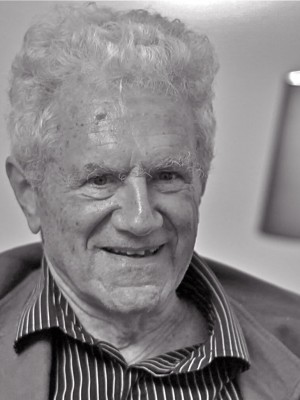
Jennifer Orr
Title: “Ulster’s Romantic Radicals: Presbyterian Poets of the 1790s”
Date: September 11, 2013, 4 pm
Location: T.R.R. Cobb House
Jennifer Orr is Irish Research Council Fellow in English at Trinity College Dublin and a lecturer in English poetry at Christ Church, University of Oxford. She is in the final stages of completing an Irish Research Council funded project Ulster Romantic Belief and Practice, to be published by Cambridge University Press. This looks at poetry and other forms of intellectual activity in the north of Ireland during the Romantic period (1790-1820). In September she takes up a tenured post at Newcastle University in the north of England as Lecturer in English.
Read more
1790s Ireland represented either one of two things, depending on your point of view. Irish men and women, having seen their brethren in America and France liberating themselves, were dizzied by the thrilling potential to gain reform and self-government for their nation where Catholics, Protestants and Dissenters might unite in the cause of a free Ireland. Others saw their future reflected in events of the Terror in France: the execution of a king and a European war that threatened the very constitutional foundation of the British Isles. A group of County Antrim poets with radical links to the Belfast United Irishmen were determined to make the most of the radical buzz around Belfast, championing a native literary culture of song, poetry of the people and showcasing the talent of Irish writers. Best of all, they could do this in their own spoken tongue of Ulster-Scots, making Ulster famous just as Robert Burns had done for Scotland.
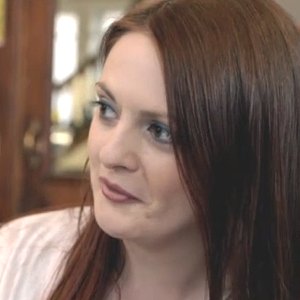
Rachel Clarke
Host: Katie Geha (Lamar Dodd School of Art)
Date: September 19, 2013, 5:30 pm
Location: Lamar Dodd School of Art, S151
Rachel Clarke combines digital and traditional media in drawings, animations and installation works, intertwining themes of nature, culture, and technology. In her show at the Lamar Dodd School of Art Galleries, she is working on a series of animations and images that deconstruct common maps. Maps are representations of human connectivity that document the way transport networks, settlements and industrial complexes interact with the environment. Mapmaking has also been used as a form of conquest, preceding the extraction of resources, or the creation of new lands, borders and boundaries. Maps represent a stable, topographically accurate, yet symbolic representation of the world as we have defined it.
Read more
Clarke is Professor of Electronic Art in the Art Department at California State University, Sacramento. Born in England, Clarke studied at Winchester School of Art, UK (BFA) and Southern Illinois University, Carbondale, Illinois (MFA). She has exhibited internationally and throughout the United States.
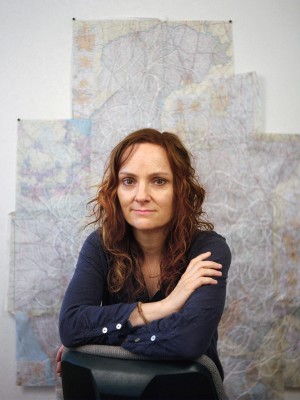
Lénablou
Host: Emily Sahakian (Department of Romance Languages)
Title: Various Events
Date: September 30-October 1, 2013
Location: Various Locations
Lénablou is a choreographer, scholar, and activist known for her innovative promotion of Caribbean performance cultures through her Techni’Ka dance technique. Based in Guadeloupe (French West Indies), her dance company TRILOGIE has toured across the world giving performances in Senegal, Niger, Slovenia, Canada, Mexico, Venezuela, French Guiana, Dominican Republic, Trinidad & Tobago, and France. In 2008, Lénablou was honored with the highest National Order decoration in France: the Chevalier de la légion d’honneur (Knight of the Legion of Honor). She will visit UGA with three of her dancers and two musicians to hold various public events.
Read more
On September 30th, Lénablou will be giving a lecture in French entitled “Le concept du bigidi: réponse d’une interculturalité forcée.” This lecture will focus on her creative method. Also on Sept. 30, Lénablou will give an open Master Class, “An Introduction to Gwo-Ka and Caribbean Dance,” in Room 352 of the Fine Arts Building, and a dance performance of “Fenêtre sur… mon bigidi et moi…” (“Window into My Imbalanced Body”) and “Yonn Dé” (“One Two”) in the New Dance Theatre. On Oct. 1, she will give an impromptu dance performance entitled “Rupture de soi” (“Shattering the Self”). Go to the Willson Events page for more details.
Lénablou’s visit is organized in partnership with Georgia State University.
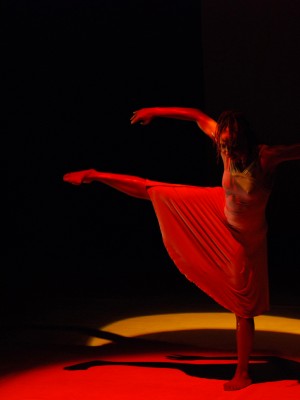
Abdul JanMohamed
Host: Peter O’Neill (Department of Comparative Literature)
Title: “The Internalization and Reproduction of Violence: Alice Walker’s ‘Third Life of Grange Copeland’”
Date: October 2, 2013, 4 pm
Location: 248 Miller Learning Center
Abdul R. JanMohamed received his Ph.D. in English and American Literature from Brandeis University in 1977. Prior to his appointment as August Baldwin Longstreet Chair in English and African American Studies at Emory (2012), Professor JanMohamed taught at the University of California, Berkeley, and prior to that at Boston University. He has been a visiting professor in many other universities. Professor JanMohamed’s research focuses on 20th Century African American fiction, Postcolonial literature (particularly African), and various aspects of critical theory. He is the author of four books: Manichean Aesthetics: The Politics of Literature in Colonial Africa (1983, 1988), The Nature and Context of Minority Discourse, (ed. with David Lloyd, 1990), The Death-Bound-Subject: Richard Wright’s Archaeology of Death (2005), and Reconsidering Social Identification: Race, Gender, Class, and Caste (ed. with Prafulla Kar, 2011). His articles have been published in a number of leading journals including 21st Century Literature, Ariel, An-kwa-Bak, boundary 2,Critical Inquiry, Cultural Critique, Cultural Studies, The Griot, and Jouvert. He was a founding editor ofCultural Critique.
Read more
According to Gramsci, any hegemony is subtended, in the final analysis, by the deployment of violence, and for hegemony to function as such, the masters’ rules, including the deployment of violence, must be adequately internalized. Abdul JanMohamed’s talk will examine the modes through which the oppressed “internalize” the violence that is used to control them, the ways in which that violence in then reproduced within the family from one generation to the next, and, finally, the modes through which that internalized violence can be exorcised, ironically, through a rechanneling of the reproduction of violence. Alice Walker’s first novel, The Third Life of Grange Copeland, brilliantly explores how the “internalization” of violence can be effectively resisted, in the final analysis, only via a counter-deployment of “internalized violence.”
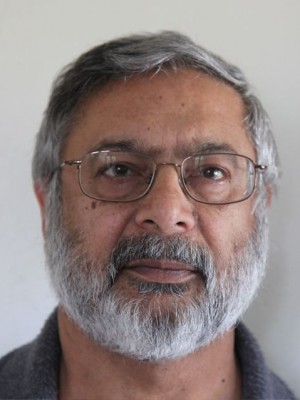
Marilynn Richtarik
Host: Nicholas Allen (Department of English, Dir. Willson Center)
Title: “Queen’s University Belfast on the Eve of Northern Ireland’s Civil Rights Movement”
Date: October 9, 2013, 4pm
Location: Park Hall, room 265
Marilynn Richtarik teaches courses in 20th-century British, Irish, and world literature at Georgia State University. Her talk focuses on the academic, cultural, political, and social milieu at Queen’s University Belfast in the early 1960s, when Stewart Parker, Seamus Heaney, and Seamus Deane were all students there. Richtarik was educated at Harvard, where she earned an undergraduate honors degree in American History and Literature, and at Oxford University, which she attended as a Rhodes Scholar. Her research interests have centered on Northern Irish theatre and drama, where politics and artistic production are intimately related.
Read more
Her first book, on the Field Day Theatre Company, was published by Oxford University Press in 1995. Author of numerous articles on Stewart Parker, she has also written program notes for productions of his plays in London, Dublin, Belfast, and Washington, DC. Her biography of Parker, which presents the career of this important writer in the context of a lively discussion of his personal history and of the turbulent times through which he lived in his native Belfast, was published by Oxford in 2012.
Richtarik has brought to Atlanta renowned scholars and artists such as Elizabeth Butler Cullingford, Seamus Deane, Bernard MacLaverty, Lucy McDiarmid, Paul Fussell, Michael Parker, and Glenn Patterson, who have lectured and performed both at the university and at venues including the Margaret Mitchell House and the Atlanta Celtic Festival. She serves Georgia State’s Honors College as the Honors Faculty Associate for Postgraduate Scholarships and coordinates the English department’s faculty works in progress group and the Atlanta Irish Studies Group.
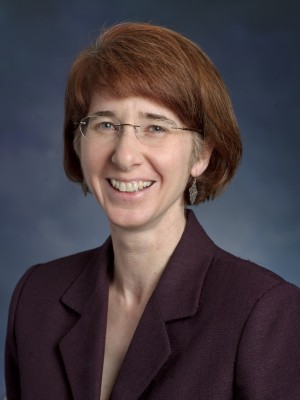
Eric Fischl
Host: Margaret Morrison (Lamar Dodd School of Art)
Date: November 5, 2013, 5:30 pm
Location: Lamar Dodd School of Art, S151
Eric Fischl is an internationally acclaimed American painter and sculptor, and is considered one of the most important figurative artists of the late 20th and early 21st centuries. Fischl’s paintings, sculptures, drawings and prints have been the subjects of numerous solo and major group exhibitions, and his work is represented in many museums, as well as prestigious private and corporate collections, including the Metropolitan Museum of Art, the Whitney Museum of American Art, the Museum of Modem Art in New York City, the Museum of Contemporary Art in Los Angeles, the St. Louis Art Museum, the Louisiana Museum of Art in Denmark, Musée Beaubourg in Paris, the Paine Weber Collection, and many others. Fischl is a fellow at both the American Academy of Arts and Letters and the American Academy of Arts and Sciences. He lives and works in Sag Harbor, New York with his wife, the painter April Gornik.
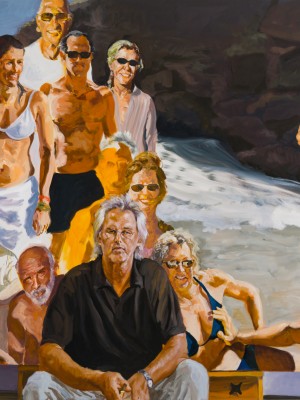
Eiléan Ní Chuilleanáin
Host: Nicholas Allen (Department of English, Dir. Willson Center)
Date: October 30, 2013, 7 pm
Location: Ciné
Eiléan Ní Chuilleanáin is often cited not only as a major poet in the generation after Kinsella, Montague and Murphy, but also as the foremost female poet now writing in Ireland and Great Britain. She graduated from University College Cork in 1962, with a B.A. in English and history, followed by a master’s in English in 1964. She later studied at Oxford. She is Associate Professor of English, Dean of the Faculty of Arts (Letters), and a Fellow of Trinity College, Dublin. She edits the literary journal, Cyphers, with two other poet-editors, including her husband MacDara Woods.
Read more
She won the Patrick Kavanagh Award for her first book, Acts and Monuments (1966), which was followed by Site of Ambush (1975), both published by the Gallery Press. Selections from these two books, published by Wake Forest University Press as The Second Voyage (1977), were re-issued in 1991 in a revised version, complimentary to a new book, The Magdalene Sermon and Earlier Poems. The Magdalene Sermon was chosen as one of the three best books of poetry of 1989 by the Irish Times/Aer Lingus Poetry Book Prize Committee. Wake Forest published The Brazen Serpent in 1995, and included many of her poems in The Wake Forest Book of Irish Women’s Poetry, 1967-2000, which came out in 1999. She and Medbh McGuckian translated the poems of Nuala Ní Dhomhnaill in The Water Horse (2001), and her volume, The Girl Who Married the Reindeer, came out in 2002. Wake Forest published her Selected Poems in 2009, and The Sun-fish,which won the International Winner of the Griffin Poetry Prize in 2010. Her newest volume, The Legend of the Walled-Up Wife, translations from the Romanian poetry of Ileana Mӑlӑncioiu, in 2012. In 1992, she was awarded the prestigious O’Shaughnessy Poetry Award by The Irish American Cultural Institute, which called her “among the very best poets of her generation.”
Eiléan was born in Cork in 1942. Her father, Cormac O’Chuilleanáin was a university professor of Irish, and her mother, Eilis Dillon, was a prolific novelist. She and her husband have a son, Niall.
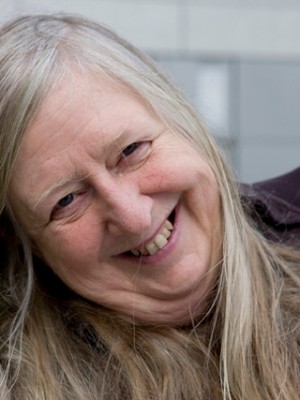
Tudor Balinisteanu
Host: Nicholas Allen (Department of English, Dir. Willson Center)
Title: “The Dracula Figure in the Writing of Bram Stoker and Liz Lochhead: A Comparative Analysis in Relation to Romanian Folklore”
Date: November 15, 2013, 11 am
Location: Demosthenian Hall
Tudor Balinisteanu is a research fellow at the University of Suceava. He received his PhD from the University of Glasgow, where he also taught in the Department of English Literature and the Comparative Literature Programme.
Read more
This talk will explore Lochhead’s re-creation of Dracula’s story and the ways in which she reconfigures it thematically and structurally to challenge the psychological and social legislation of the relation between subjective identity, nature, and the body, as expressed in Victorian social myths. Balinisteanu compares representations of vampires in Stoker’s Draculawith their feminist revisions in Lochhead’s play of the same title, and with representations of vampire-like creatures in Romanian folklore traditions.
The comparison of these different ways of representing vampires shows that the narrative expression of vampires in Stoker’s text is an effect of a repudiation of alternative understandings of vampires as cultural markers of ungovernable nature and the organic, promoted in the folkloric tradition. Using Romanian folklore traditions as context, Balinisteanu analyzes Lochhead’s play, Dracula, (first performed in 1987) against Stoker’s original, establishing in her play a body oriented, feminist text, which simultaneously highlights and contradicts Stoker’s diminishing of the sexualized powerful female body and the foreign other. The comparison with folklore material provides the basis of the argument that Lochhead’s version of the vampire myth undermines the social and sexual controls enabled by Stoker’s text.

Jennifer Fay
Host: Christopher Sieving (Department of Theatre & Film Studies)
Title: “Atomic Screen Tests”
Date: January 24, 2013, 12:20 pm
Location: Fine Arts, room 53
Jennifer Fay is associate professor of film studies and English at Vanderbilt University where she also directs the film studies program. She is the author of Theaters of Occupation and co-author of Film Noir: Hard-Boiled Modernity and the Cultures of Globalization.
Read more
The atomic testing films produced by the US Air Force in the 1940s and ’50s strive not only to normalize and visualize a schedule of atomic blasts in the Nevada desert; they transform the otherworldly violence of bombing into un-sublime, surviveable, non-events in which various materials (including human materials) are tested and trained to sustain the bomb even as bombs are improved to create more damage. This is a perverse dialectic of improvement that views destruction as the engine of building. But these films are also screen tests in the cinematic sense that they test the representability of the atomic blast, for which the bomb is less about wielding actual power than the ability to produce the image of power.
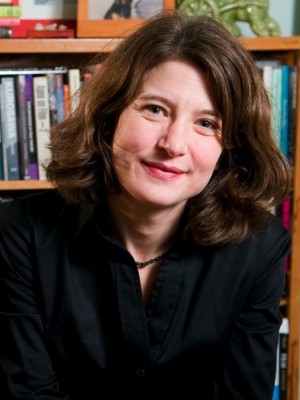
Alberto Sandoval-Sánchez
Host: Betina Kaplan (Department of Romance Languages)
Title: “Feeling Latino/a on Broadway: ‘In the Heights”s Spectacular Claim for Latinidad and Cultural Citizenship”
Date: February 3, 2013, 2:30 pm
Location: MLC, room 148
Alberto Sandoval-Sánchez is Professor of Spanish and U.S. Latina/o literature at Mount Holyoke College since 1983. He received his Ph.D. in 1983 at the University of Minnesota. He is both a cultural critic and a creative writer.
Read more
His bilingual book of poetry New York Backstage/Nueva York Tras Bastidores (Cuarto Propio, 1993) was published in Chile. In 1993 Mount Holyoke College produced his theatrical piece Side Effects, based on his own personal experiences with AIDS. In 1994 he edited a special issue of Ollantay Theater Magazine on U.S. Latina/o theatre and AIDS. He has published numerous articles in books and journals on U.S. Latina/o theatre, Latin American colonial theatre, and Puerto Rican migration. He is the author of José Can You See?: Latinos On and Off Broadway (The University of Wisconsin Press, 1999) and co-editor of Puro Teatro: A Latina Anthology (The University of Arizona Press, 2000, in collaboration with Nancy S. Sternbach from Smith College); followed by a critical study, Stages of Life: Transcultural Performance and Identity in Latina Theatre, also in collaboration with Sternbach (Arizona, 2001). He co-edited with Frances R. Aparicio (University of Illinois, Chicago) a special issue on U.S. Latina/o literature and culture, Hibridismos Culturales, in 2005 forRevista Iberoamericana, and he also co-edited (Jotopías/Patopías) with Ramón Rivera-Servera (Northwestern University) a special issue on U.S. Latina/o queer theater and performance for Ollantay Theater Magazine (2008). His present research and scholarship center on the staging of monstrosity, enfreakment, queerness, and abjection on Broadway and minority theatre. He is also working on trauma, memory, death, and mourning in U.S. Latina/o theatre.
The impact of In the Heights in the national cultural imaginary is unprecedented. In the here and now of the musical production, a new Latina/o generation bears witness to a historical Broadway phenomenon which is well-anchored in situated and lived Latina/o experiences. To understand the musical critically requires not only charting a genealogy of Latina/o theatre but unpacking the ideological contextualization at work in the reception of Latinidad matters. Two crucial questions must be asked: Is In the Heights a community-based theatre production with a big budget or does its storyline conform to the traditional Broadway formula of success and achievement of the American Dream? Sandoval-Sánchez proposes that the response to these questions is not registered in the plot of the show per se; rather it is found in performative cultural texts that embody the ideological scaffold of the musical: Lin Manuel Miranda’s award acceptance speech at the Tony Awards (2008); the PBS aired documentary of the making of the show and of the dream of making it on Broadway (Chasing Broadway Dreams, 2009); the Flash Mob America event enacted in L.A. during the tour of the road show (June 2010); and Israel Cortez’s virtual queer parody of the musical.
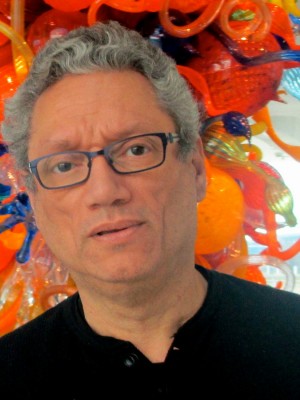
Louis Menand
Host: Carissa DiCindio (GMOA)
Title: “The Many Lessons of Advancing American Art”
Date: February 6, 2013, 6 pm
Location: Georgia Museum of Art
Louis Menand is Anne T. and Robert M. Bass Professor of English and American Literature and Language at Harvard University. He received his bachelor’s degree from Pomona College and his master’s and doctoral degrees from Columbia University. His interests include 19th- and 20th-century cultural history, and he is a regular writer for The New Yorker and the New York Review of Books. He was awarded the 2002 Pulitzer Prize for history for The Metaphysical Club, which also won the Francis Parkman Prize from the Society of American Historians. Other works include The Marketplace of Ideas (2010), American Studies (2002), andDiscovering Modernism: T. S. Eliot and His Context (1987).
This event is cosponsored by the Willson Center, the Richard B. Russell Library for Political Research and Studies, and the Georgia Museum of Art.
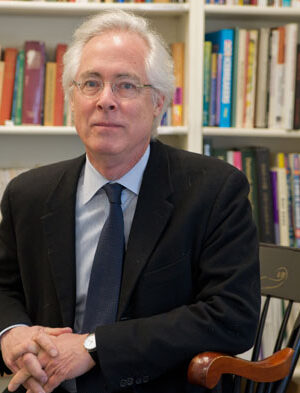
Mieczyslaw Szlezer
Host: Levon Ambartsumian (School of Music)
Performance Date: February 6, 2013, 8 pm
Location: Ramsey Concert Hall
ARCO Chamber Orchestra will perform a free concert, “All Bach,” on Thursday February 6 at 8 p.m. The concert features two violin concerti with guest soloists Mieczyslaw Szlezer, Distinguished Professor of Violin and Head of the Violin and Viola Department at the Academy of Music in Krakow, Poland, and Levon Ambartsumian, Franklin Professor of Violin in the Hugh Hodgson School of Music. The program also includes Brandenburg Concerto # 1 featuring UGA graduate students Colton Cox, Holly Blanchette, and Liz Fleissner, oboes; Matt Huff, bassoon; Lauren Hunt and Joel Ockerman, horns; and faculty member Evgeny Rivkin on harpsichord.
Read more
Mieczyslaw Szlezer graduated with honors in 1979 from the Academy of Music in Krakow, where he studied violin under his father, Professor Zbigniew Szlezer, renowned violinist and teacher. From 1982 to 1985 he continued his studies at the Indiana University School of Music with Professor Joseph Gingold and Professor Taduesz Wronkski; the Geneva Conservatory with Professor Henryk Szeryng; and the Accademia Chigiana in Sienna with Professor Franco Gulli.
Szlezer has won a number of international violin and chamber music competitions. Since 1975 he has performed as a soloist or in chamber music ensembles in 28 different countries in Europe, Asia, and North and South America. Between 1978 and 1987 he worked as a soloist and concertmaster of the Capella Cracoviensis orchestra, and between 1987 and 2000 he was the soloist and first concertmaster of the Karol Szymanowski State Philharmonic Orchestra in Krakow. He has been a member of the piano trio Artemus since 1995.
Mieczyslaw Szlezer has made numerous recordings for radio and television, and he has recorded CDs for PRiTV, RAJ, Yogoton, France Musique, Equiant-Japan, Stebo and Moderato. From 1996 to 2002 he served as Vice-Dean of the Instrumental Department at the Academy of Music in Krakow, and he served as Vice-Rector from 2002 to 2008. Currently, he is a Distinguished Professor of Violin at the Academy of Music in Krakow and has headed the Violin and Viola Department since 2008.
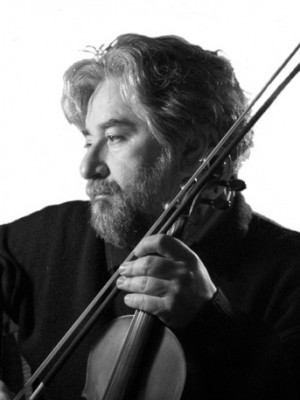
Charles W. Mills
Host: Ed Halper (Department of Philosophy)
Date: February 7, 2013, 3:30 pm
Location: 115 Peabody Hall
Charles W. Mills is John Evans Professor of Moral and Intellectual Philosophy at Northwestern University. He works in the general area of social and political philosophy, particularly in oppositional political theory as centered on class, gender, and race. In recent years he has been focusing on race.
Read more
He received his Ph.D. at the University of Toronto, and is the author of numerous articles and book chapters, and five books. His first book, The Racial Contract (Cornell University, 1997), won a Myers Outstanding Book Award for the study of bigotry and human rights in North America. It has been adopted widely in courses across the United States, not just in philosophy, but also political science, sociology, anthropology, African-American studies, and race relations. His second book, Blackness Visible: Essays on Philosophy and Race (Cornell University, 1998), was a finalist for the award for the most important North American work in social philosophy of that year. His fourth book, Contract and Domination (Polity Press, 2007), is co-authored with Carole Pateman, who wrote The Sexual Contract (Stanford University Press, 1988), and it seeks to bring the two “contracts” together. His most recent book is a collection of his Caribbean essays, Radical Theory, Caribbean Reality: Race, Class and Social Domination (University of the West Indies Press, 2010).
Before joining Northwestern, Charles Mills taught at the University of Oklahoma and the University of Illinois at Chicago, where he was a UIC Distinguished Professor.
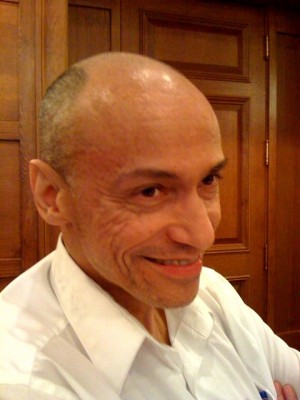
Randall Faber
Host: Peter Jutras (Hugh Hodgson School of Music)
Title: Piano Pedagogy Symposium
Date: February 8, 2013
Location: Ramsey Concert Hall
The piano faculty of the Hugh Hodgson School of Music are pleased to host Dr. Randall Faber, nationally recognized clinician and co-author of the bestselling Piano Adventures series for a Piano Pedagogy Symposium. This event is open to piano teachers and students from across the Southeast and will be offered free of charge. The all-day event will be held in Ramsey Hall in the UGA Performing Arts Center, and will include sessions from Dr. Faber titled “The ABCs of Artistry,” “Stages of Talent Development” and “Tapping the Creative Core”. For more information, please contact Pete Jutras at pjutras@uga.edu.
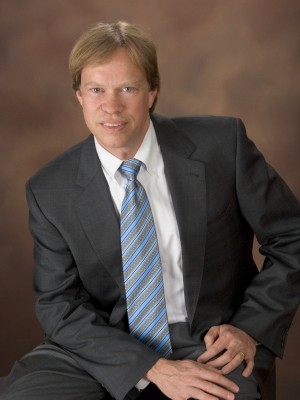
Sergio Chejfec
Host: Betina Kaplan (Department of Romance Languages)
Date: February 11, 2013, 11 am
Location: Tate Student Center, room 137
Since 1990 Argentine writer Sergio Chejfec has published more than a dozen books of fiction, poetry, and essays. In a recent review of one of his novels the Times Literary Supplement observed that “[i]t is hard to think of another contemporary writer who, marrying true intellect with simple description of a space, simultaneously covers so little and so much ground.” Three of his novels, My Two Worlds, The Planets, and The Dark were published in English translation by Open Letter. He has been a fellow of the Guggenheim Foundation in 2000 and the Civitella Ranieri Foundation in 2007. His work has also been translated into French, German, and Portuguese. Chejfec currently lives in New York and teaches in the Creative Writing in Spanish Program at NYU.
Read more
Following a bilingual reading and a conversation about his work, Chejfec will offer a creative writing workshop in Spanish to interested faculty, graduate students and advanced Spanish undergraduate students.
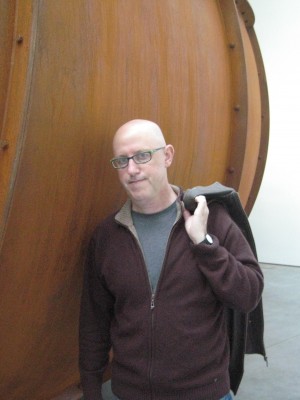
Patricia Shehan Campbell
Host: Roy Legette (School of Music)
Title: “Surround Sound: Experiencing Music, Expressing Culture”
Date: February 27, 2013, 7:30 pm
Location: Edge Recital Hall
Music is sonic art and very much more. The location of meaning in music emanates from the relationship of its sounds to evolving and multivalent social and cultural constructs. Music is embedded in living culture that evolves over time and place, and musical meaning is most fully understood in the ever-changing contexts of cultural history, social setting, and purpose. As it is experienced through listening, performance, and creative invention, music is made meaningful and useful by people: It becomes them, expressing their identities and their histories, legacies, and lineages. Through a selection of musical expressions, Patricia Shehan Campbell will suggest that music fulfills the human need for music as art for aesthetic satisfaction, a social behavior contributing to gender and kinship, a symbol with reference to a world beyond music, a commodity with economic valuation, a repository of traditional indigenous knowledge, a manifestation of ideology and very much more.
Read more
Campbell is Donald E. Peterson Professor of Music at the University of Washington, where she teaches courses at the interface of education and ethnomusicology. She is the author of Songs in Their Heads (1998; 2010, 2nd edition), Musician and Teacher: Orentation to Music Education (2008), Tunes and Grooves in Music Education(2008), Teaching Music Globally (2004), and co-editor (with Bonnie Wade) of Oxford’s Global Music Series, Lessons from the World (1991/2001), Music in Cultural Context (1996), co-author of Music in Childhood (2013, 4th edition) andFree to Be Musical: Group Improvisation in Music (2010), and co-editor of the Oxford Handbook on Children’s Musical Cultures (2013).
She has lectured on the pedagogy of world music and children’s musical culture throughout the United States, in much of Europe and Asia, in Australia, New Zealand, South America, and South Africa. Her training includes Dalcroze Eurhythmics, piano and vocal performance, and specialized study in Bulgarian choral song, Indian (Karnatic) vocal repertoire, and Thai mahori. She serves on the editorial boards for Psychology of Music(U.K.), the Journal of Research in Music Education (U.S.), and Research Studies in Music Education (Australia), and is former editor of Symposium. She is a member of the board of Smithsonian Institution’s Folkways and of the nationally syndicated weekly radio program,American Routes.
Campbell has coordinated university-community music partnership projects for children, families, and the local community, including Music Alive! in the Yakima Valley, First Band at First Place School, the Laurelhurst Music Program (with its accent on the development of children’s global consciousness and cross-cultural literacies through music), and musical exchanges at the Yakama Nation Tribal School. Campbell received one of several Taichi Traditional Music Awards in 2013 (along with Ravi Shankar, Bruno Nettl, and Ali Jihad Racy) for her work on the transmission, teaching, and preservation of traditional music in schools and university programs of music education. She began her term as president of The College Music Society in 2013.
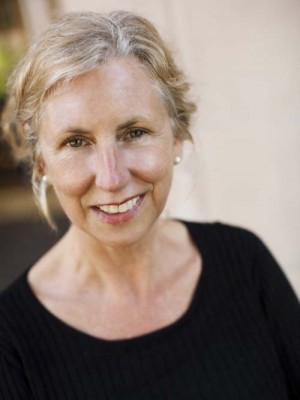
Andrew McNeillie
Host: Nicholas Allen (Department of English, Dir. Willson Center)
Date: March 5, 2013, 5 pm
Location: Demosthenian Hall
This event will begin at 5 p.m. with a public conversation with Andrew McNeillie, founding editor of Archipelago magazine and director of Clutag Press, and Nicholas Allen, Franklin Professor of English and director of the Willson Center at UGA, on literature, publishing, and Archipelago. McNeillie will give a reading of his poetry from 6:15 to 6:45 p.m. There will be a short reception between the conversation and the reading.
Read more
Andrew McNeillie was born in North Wales and read English at Magdalen College, Oxford before becoming an editor and publisher. For many years he was literature editor at Oxford University Press. He has also held a chair in English at Exeter University where he is now Emeritus Professor. He is the founding editor of the magazine Archipelago and runs the Clutag Press. His memoir Once appeared in 2009 from Seren. His Carcanet poetry collections are Nevermore(Oxford Poets, 2000), Now, Then (2002), Slower (2006), In Mortal Memory (2010) and Winter Moorings (2014). His memoir, An Aran Keening, was published in 2001.
McNeillie is here to celebrate publication of Winter Moorings this spring. His sixth collection returns to the sea and its immensity as a metaphor for fate. It also revisits the British and Irish archipelago (“For which read a figure for my heart. / For which too read a figure for time’s hurt”), following a north-western trajectory from the Aran Islands to the Hebrides. The natural world is seen here in both its beauty and its indifference to human beings (“There’s many a thing more lasting than a person”). From a version of “The Seafarer” to an elegiac play “for sounds and voices” retelling the story of an English airman drowned off Aran in World War II, these poems speak of lives and deaths across the reaches of history.
“Andrew McNeillie is a leading figure in the contemporary movement to bring sea, coast and islands back into the contemporary cultural geography of our human condition. A generous guide to generations of critics and writers through his scholarly editorship, and work on Archipelago, one of the great modern small press magazines, McNeillie is a rare presence and a wonderful opportunity for students to see how a life in letters grows in many unexpected directions,” says Nicholas Allen.
Andrew McNeillie’s visit to the Willson Center is presented in partnership with Emory University, where he will also lecture.
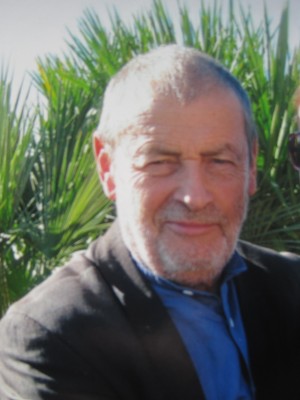
Nora Gámez Torres
Host: Susan Thomas
Title: “Music and Politics in Contemporary Cuba”
Date: March 6, 2013, 5 pm
Location: Hugh Hodgson School of Music, room 412
Nora Gámez Torres will give a talk on ”Music and Politics in Contemporary Cuba” Thursday, March 6 at 5 p.m. in room 412 of the UGA Hugh Hodgson School of Music. Nora Gámez Torres earned her Ph.D. in in Sociology from City University London. She also attended the London School of Economics and Political Science, where she obtained a Master in Media and Communications, and the University of Havana, where she earned a Master in Social Communication and where she completed her B.A. with honors. In 2011 Torres was a short term visiting scholar at the David Rockefeller Center for Latin American Studies. Currently she is a visiting scholar at the Cuban Research Institute at Florida International University.
Read more
Gámez Torres’s current work focuses on the connection between popular music and social and political issues in Cuba. Her visit to UGA is supported by the Willson Center’s Distinguished Artist or Lecturer program.
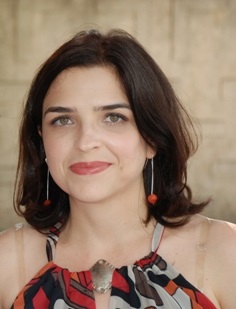
Jill Stoner
Host: Isabelle Loring Wallace (Lamard Dodd School of Art)
Title: “after Architecture”
Date: April 3, 2013, 5:30 pm
Location: Georgia Museum of Art Auditorium
Jill Stoner is Professor of Architecture and Chair of the Center for Jewish Studies at the University of California, Berkeley. She is the author of two books that reside at the intersection of architecture and literature, winner of numerous national and international awards in the area of landscape urbanism, and has held a “Sabbatical-in-Residence” position at the US Department of Housing and Urban Development. Her current research and teaching focuses on the theoretical and pragmatic potentials of urban vacancy.
Read more
This talk, drawing upon Stoner’s recent book Toward a minor architecture, proposes a new approach to the contemporary metropolis, drawing from disciplines of fiction, politics, art and critical theory. Three key witnesses to a set of obsolete mythologies– the Prisoner, the Blind Man and the Peregrine Falcon– offer alternative lenses through which to view architecture’s future, absent its Capital letter.
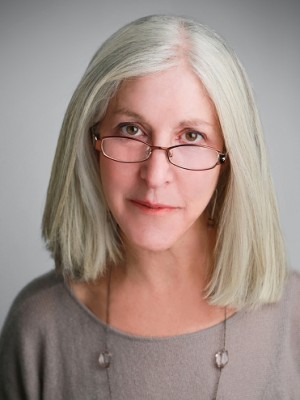
Michael P. Nelson
Host: Piers Stephens (Department of Philosophy)
Title: “Wolves and Moose, Science and Philosophy: toward the invisible fusion”
Date: April 11, 2013, 3:30 pm
Location: 205S Peabody Hall
Michael P. Nelson, a philosopher and environmental ethicist, is the co-editor of Moral Ground: Ethical Action for a Planet in Peril with Kathleen Dean Moore. He has performed extensive research on the wolves and moose on Isle Royale. The project deals with the isolated wolf and moose communities on Isle Royale, including the genetic constitution of the wolves and ethical dimensions of whether or not to introduce new wolves.
Read more
Isle Royale in Lake Superior, North America, is home to the longest continuous study of a predator-prey system in the world. Currently in the midst of its 55th year, ecologists are learning how wolves and moose interact in this single-predator, single-prey system. But this isn’t just about long-term ecological science. The Isle Royale Wolf-Moose Project team also includes geneticists, social scientists, filmmakers, and one bewildered philosopher, Michael P. Nelson.
The project has had important implications for and direct impact upon our policies about wolves, and offers an example of efforts to understand something about the human relationship with nature that lies at the edges or fusions of our academic disciplines.
Part of the Scott & Heather Kleiner Lecture Series, supported by the Willson Center.
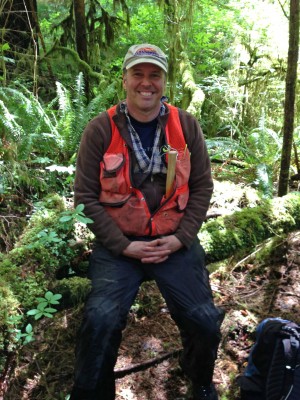
Benjamin Schmidt
Host: Jamie Kreiner (Department of History)
Lecture Title: “Data-Driven Histories: Reinterpreting Nineteenth-Century Data”
Workshop Title: “Doing Digital History: A Graduate Student Workshop”
Date: April 21-22, 2013
Location: Various
Ben Schmidt is Assistant Professor of History at Northeastern University and core faculty at the NuLab for Texts, Maps, and Networks. His digital humanities research focuses particularly on text mining and massive historical datasets, with work in topic modeling, visualization, and thematic mapping, some of which he presents on his blog Sapping Attention. He also maintains a blog called Prochronism, where he discusses the use and misuse of historical language in TV and film. His work has been published and reported in the Journal of Digital Humanities, The Atlantic, The New Republic, and The New York Times. This lecture is sponsored by the Department of History, the Willson Center for Humanities and Arts, and eHistory at UGA.
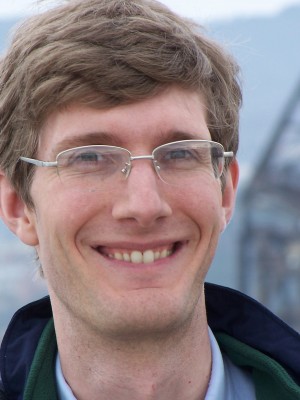
2012 – 2013
Frank Shovlin
Host: Nicholas Allen
Title: “‘Their Friends, the French’: Joyce and Jacobitism”
Date: September 6, 2013, 4 pm
Frank Shovlin is Senior Lecturer in the Institute of Irish Studies, University of Liverpool. His research interests include the Irish literary revival, the life and work of James Joyce, the history of reading in twentieth-century Ireland, the history of the book, and the work of John McGahern.
Read more
He is author of Journey Westward: Joyce, Dubliners and the Literary Revival (2012) and The Irish Literary Periodical 1923-1958 (2003).
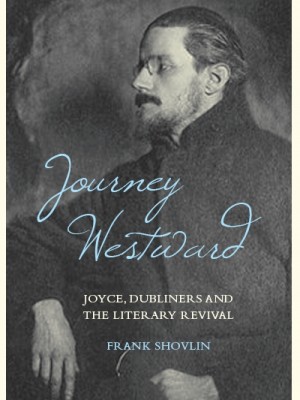
Paul Tough
Host: Nicholas Allen
Title: “How Children Succeed”
Date: October 1, 7 pm
Paul Tough is the author of Whatever It Takes: Geoffrey Canada’s Quest to Change Harlem and America. His new book, How Children Succeed: Grit, Curiosity, and the Hidden Power of Character, will be published in September 2012 by Houghton Mifflin Harcourt. He has written extensively about education, child development, poverty, and politics, including cover stories in The New York Times Magazine on character education, the achievement gap, and the Harlem Children’s Zone. He has worked as an editor at The New York Times Magazine and Harper’s Magazine and as a reporter and producer for the public radio program “This American Life.” He was the founding editor of Open Letters, an online magazine. His writing has appeared in The New Yorker, Slate, GQ, Esquire, and Geist, and on the op-ed page of The New York Times.
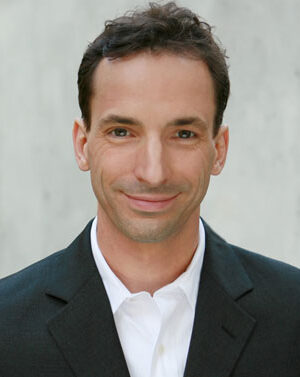
Donald Hodges
Host: Roy Legette (Hugh Hodgson School of Music)
Title: “Peering Into the Musical Brain”
Date: October 4, 7:30 pm
Donald Hodges is the Covington Distinguished Professor of Music Education and Director of the Music Research Institute (MRI) at the University of North Carolina at Greensboro. At the MRI he oversees more than 40 active research projects divided into six categories: BioMusic, Neuroimaging of Musicians, Music Education, Musicians’ Hearing Health, Music Performance, and Ethnomusicology-Ecocriticism.
Read more
Dr. Hodges has authored more than 140 book chapters, papers, and multimedia programs in music education and music psychology. He was contributing editor of the Handbook of Music Psychology and the accompanying Multimedia Companion (1980, 1996). His newest book, Music in the Human Experience: An Introduction to Music Psychology, co-authored in2011, is designed for students of music psychology, enthnomusicology, anthropology, and acoustics. This writing critically examines why and how we make sense of music and respond to it cognitively, physically, and emotionally. Recent research efforts have included a series of brain imaging studies of pianists, conductors, and singers using Positron Emission Tomography (PET) and Magnetic Resonance Imaging (MRI).
Over the past 20 years, Dr. Hodges has conducted a series of brain imaging studies designed to map the musical brain. His goal has been to understand how neural mechanisms support various components of musical behavior. Toward that end, he has scanned pianists while performing Bach, singers as they vocally improvised melodies, and conductors as they detected errors in performances of a musical score, and as they processed multisensory (i.e., auditory and visual) information. Most recently, Dr. Hodges and his colleagues have been investigating complex brain networks in trained musicians and untrained controls. While stating that there is still much to learn, Dr. Hodges believes that a picture of the musical brain is beginning to emerge. This presentation will include numerous colored brain images of PET and fMRI scans, as well as musical examples.
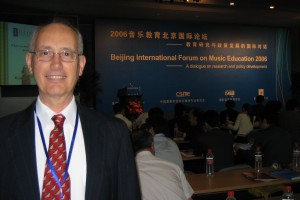
Benjamin Reiss
Title: “Wild Things vs. Sleep Nazis: How Children’s Bedtime Became a Problem”
Date: October 4, 2012, 4 pm
Benjamin Reiss, Professor of English at Emory University, specializes in 19th-century American literature and culture, with strong interests in the history of medicine, race, disability, and popular culture. He is an editor of the Cambridge History of the American Novel, a collection of 70 new essays by leading scholars.
Read more
Reiss is the author of The Showman and the Slave: Race, Death, and Memory in Barnum’s America (Harvard UP, 2001; repr. 2010) and Theaters of Madness: Insane Asylums and Nineteenth-Century American Culture (University of Chicago Press, 2008), as well as essays in journals including American Literary History, Social Text, ELH, American Quarterly, The Chronicle of Higher Education, and Slate. In addition, he has appeared on numerous NPR and PRI radio programs discussing his work. He is now working on Managing Sleep, a book that explores how sleep came to be a problem in need of micro-management, medical attention, and pervasive worry. The book braids together literary, medical, religious, and social history from the Enlightenment to the present. A portion of this work, “Sleeping at Walden Pond,” is forthcoming in the journal American Literature.
Professor Reiss teaches courses in traditional literary periods (such as the Nineteenth-Century American Novel and Antebellum American Literature), as well as courses that blend literary analysis with cultural studies, cultural and social history, and the history of medicine and disability. These include Literature and Madness; Sleep in Science and Culture; and Disability and American Culture. Reiss has also taught at Tulane University, and he is the recipient of grants and fellowships from the Mellon Foundation, the NEH, the Louisiana Board of Regents, and Emory’s Fox Center for Humanistic Inquiry.
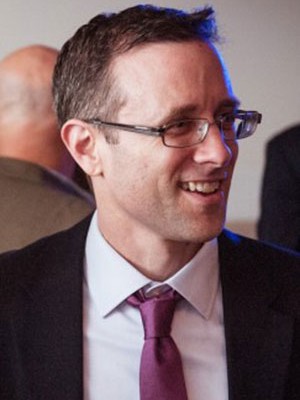
Suzanne Matson
Host: Nicholas Allen
Title: “Reading”
Date: October 11, 7 pm
Originally from Portland, Oregon, Suzanne Matson received a BA in English from Portland State University in 1981, an MA in English and Creative Writing in 1983 from the University of Washington, and a PhD in English in 1987, also from Washington, where she was awarded the Robert B. Heilman Dissertation Prize, an Academy of American Poets Prize, and the Susannah McMurphy Fellowship. Since 1988 she has taught at Boston College where she is a full professor and the chair of the English department. In 2011 she also became a faculty member at Fairfield University’s Low-Residency MFA.
Read more
A recipient of fellowships from the National Endowment for the Arts, Massachusetts Cultural Council and the American-Scandinavian Foundation, Matson’s most recent novel is The Tree-Sitter, published by W. W. Norton in both hardcover and paperback (2006). Her previous two novels, also from Norton and reissued in paperback by Ballantine, are A Trick of Nature (2000) and The Hunger Moon (1997).
Her books of poems are Durable Goods (1993) and Sea Level (1990), published by Alice James Books. Many of the poems collected in these volumes were previously published in journals including The American Poetry Review, Poetry, The Boston Review, Poetry Northwest, The Southern Poetry Review, Harvard Review, Indiana Review, and Shenandoah.
Her autobiographical, literary, and op-ed essays have appeared in periodicals such as The New York Times Magazine, The Boston Globe, Child, The Seattle Times, The American Poetry Review, Harvard Review, and Mid-American Review.
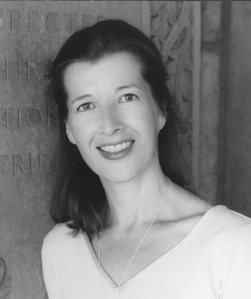
Robert Connor
Host: Nicholas Allen
Title: “The Cliff, the River and the Sea: Reflections on Extreme Literature in Ancient and Modern Times”
Date: November 7, 2013, 4 pm
Robert Connor is senior advisor and past president of the New York-based Teagle Foundation.The Teagle Foundation serves as an influential national voice and a catalyst for change in higher education to improve undergraduate student learning in the arts and sciences.
Read more
Connor is an advocate for liberal education, the humanities and especially the ancient Greek and Roman classics. He was born in Worcester, Massachusetts, graduated from Hamilton College, and after a stint in Oxford, received his Ph.D. in Classics from Princeton in 1961. A few years later, he returned to Princeton, where he taught and administered until 1989, when he became the president and director of the National Humanities Center in the Research Triangle Park of North Carolina (1989-2003). He holds honorary degrees from several colleges and is a fellow of the American Academy of Arts and Sciences and the American Philosophical Society
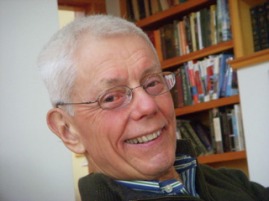
Stephen Tepper
Host: Mark Callahan (Ideas for Creative Exploration [ICE], Lamar Dodd School of Art)
Title: “Creative Work and the Work of Creativity: How Colleges and Universities Can Prepare Graduates to Reinvent Our World”
Date: January 22, 2013, 4 pm
Steven Tepper is a leader in the field of cultural policy and research on the impact of the arts on everyday life. He is the Associate Director of the Curb Center for Art, Enterprise and Public Policy and an Associate Professor of Sociology at Vanderbilt University. At the Curb Center, Tepper works to develop national policy reports and to create research tools that examine and measure the effectiveness of support models for the arts. He currently serves as the principal investigator of “Artful Living: Examining the Relationship Between Artistic Practice, Subjective Wellbeing and Materialism Across Three National Surveys,” supported by a research grant from the National Endowment for the Arts.
Read more
Tepper’s most recent publication is a book entitled Not Here, Not Now, Not That! Protest Over Art and Media in America (University of Chicago, 2011). He was the co-editor, with Bill Ivey, of Engaging Art: The Next Great Transformation of America’s Cultural Life (Routledge, 2007). His articles appear in numerous publications, including the Chronicle of Higher Education, Review of Policy Research, Journal of Arts Management, Law and Society, and the Journal of Cultural Economics.
Tepper earned a bachelor’s degree from the University of North Carolina at Chapel Hill and a master’s in public policy from Harvard University’s John F. Kennedy School of Government. He received a Ph.D. in sociology from Princeton University, where he later served as Deputy Director of the Princeton University Center for Arts and Cultural Policy Studies.
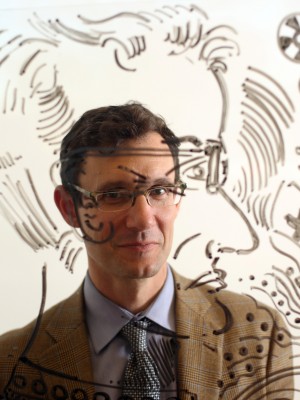
William A. Schabas
Host: Diane Marie Amann (School of Law)
Title: “Human Rights and Culture”
Date: February 7, 2013, 4:30 pm
Chairman of the Irish Centre for Human Rights William A. Schabas will present “Human Rights and Culture.” Schabas, who is a professor of international law at Middlesex University London, is an internationally respected expert on human rights law, genocide and the death penalty and is a prolific author. He has often been invited to participate in international human rights missions on behalf of non-governmental organizations such as Amnesty International (International Secretariat) and the International Federation of Human Rights and served as a member of the Sierra Leone Truth and Reconciliation Commission from 2002 to 2004.
Read more
The succinct codification that constitutes the fountainhead of modern human rights, the Universal Declaration of Human Rights of 1948, speaks of “the right freely to participate in the cultural life of the community” as well as of the right “to enjoy the arts.” One of the two main treaties to flow from the Declaration is called the International Covenant on Economic, Social and Cultural Rights, which reaffirms the notion of “cultural life” but does not repeat the reference to “the arts.” There is a tendency to confine the scope of “cultural rights” to the protection of various attributes of the lives of ethnic minorities. The long-neglected association between human rights, “culture” and “the arts” is the subject of the lecture. It will reflect upon the aspirational dimension of the culture and the arts, espoused by Matthew Arnold in the 19th century, including the concern that this may be an elitist vision ill suited to the egalitarianism of modern human rights.
The lecture is presented in cooperation with the University of Georgia School of Law’s Dean Rusk Center for International Law and Policy.

Edgar Schneider
Host: William Kretzschmar (Department of English)
Title: “World Englishes: New Language Forms Mushrooming in New Contexts”
Date: February 27, 2013, 4 pm
Edgar W. Schneider holds the Chair of English Linguistics at the University of Regensburg, Germany, after previous appointments as an assistant professor at the University of Bamberg (where he received his PhD in 1981), as a research associate at the University of Georgia, and as a Full Professor at the Free University of Berlin.
Read more
He has written and edited several books, including American Earlier Black English (1989, a revised version of his dissertation, published in Alabama), Variabilität, Polysemie und Unschärfe der Wortbedeutung (2 vols, 1988), Introduction to Quantitative Analysis of Linguistic Survey Data (1996); Focus on the USA (ed., 1996); Englishes Around the World (2 vols., ed., 1997); Degrees of Restructuring in Creole Languages (ed., 2000); Handbook of Varieties of English (2 vols., ed., 2004); Postcolonial English (Cambridge UP, 2007) and English Around the World: An Introduction (CUP 2011).
He has also published many articles and reviews on the dialectology, sociolinguistics, history, semantics and varieties of English in leading journals, collective volumes, and international handbooks. He has lectured in many countries on all continents, served as a reviewer and advisor for universities, publishers and other academic institutions, and held a variety of academic functions, including Dean of his faculty. He is the editor of the scholarly journal English World-Wide and edited its associated book series, Varieties of English Around the World.
The last few decades have seen an unprecedented growth and expansion of the English language all around the globe – originally as postcolonial heritage in countries such as India, Singapore, The Philippines, Nigeria, or South Africa, but increasingly also outside of such domains, e.g. as the sole working language of ASEAN, the Association of South-East Asian Nations. In close to a hundred countries, mostly in Asia and Africa, new local varieties of English have emerged and become established, so an international traveler is exposed to a bewildering range of new accents and dialects today.
A new sub-discipline of linguistics has grown to investigate these processes and language forms, as well as associated issues of identity expression, multilingualism, language policy and pedagogy, language contact effects, etc. This lecture will introduce the audience to some of these phenomena and new varieties of English, based on a short historical and geographical survey of the processes which stand behind it, a discussion of a few political, cultural and linguistic issues that have been raised in this context, and the presentation and characterization of a few audio and text samples of select varieties in question.
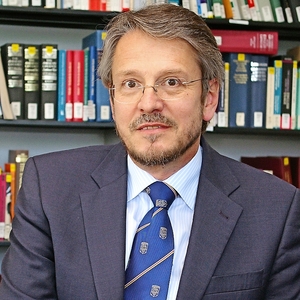
Yolanda Martínez-San Miguel
Host: Lorgia García Peña (Department of Romance Languages)
Title: “The Afro-Boricua Mirror Stage: Down These Mean Streets as Foundational Narrative of Puerto Rican and Chicano Studies”
Date: April 1, 2013, 4 pm
Yolanda Martínez-San Miguel is Professor I and Director of the Institute for Research on Women at Rutgers University. In addition she teaches in the Latino Studies Program and the Comparative Literature Program at Rutgers, the State University of New Jersey. She holds a PhD in Spanish from the University of California, Berkeley (1996). Her areas of research and teaching are Colonial Latin American discourses and contemporary Caribbean and Latino narratives; colonial and postcolonial theory, migration and cultural studies.
Read more
Professor Martínez-San Miguel is the author of Saberes americanos: subalternidad y epistemología en los escritos de Sor Juana (Pittsburgh: Instituto Internacional de Literatura Iberoamericana, 1999); Caribe Two Ways: cultura de la migración en el Caribe insular hispánico (Ediciones Callejón, 2003); and From Lack to Excess: ‘Minor’ Readings of Colonial Latin American Literature (Lewisburg: Bucknell UP, 2008). She edited with Mabel Moraña the compilation of essays Nictimene sacrílega: homenaje a Georgina Sabat de Rivers (México: Iberoamericana and Claustro de Sor Juana 2003). She is currently working on her fourth book project entitled Coloniality of Diasporas: Rethinking Intra-Colonial Migrations in a Pan-Caribbean Context, a comparative study on internal Caribbean migrations between former/actual metropolis and colonies, to question transnational and postcolonial approaches to massive population displacements and their cultural productions.
In his foundational book Black Skins, White Masks (1952), Frantz Fanon questions the applicability of Lacan’s mirror stage to the constitution of the Black subjectivity of the colonized Antillean child. Fanon argues that in the crucial moment for the constitution of his identity, the Black child confronts the dissonance of his racial identification when confronting the “universal” and racially blind narrative of subjectification proponed by psychoanalysis. Fanon’s criticism of Lacan’s mirror stage has been discussed by David Eng in Racial Castration: Managing Masculinity in Asian America (2001) and by Antonio Viego in Dead Subjects: Towards a Politics of Loss in Latino Studies (2007). Lorgia García Peña argues that in his foundational narrative Down These Means Streets (1967), Piri Thomas offers another reading of the mirror stage scene, specifically when Piri travels to the South of the United States to confront racial segregation.
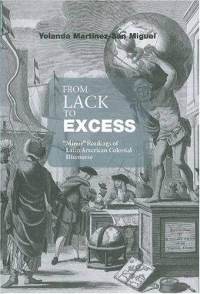
Maggie Nelson
>Host: Andrew Zawacki and Caroline Young (Department of English)
Title: “The Art of Cruelty: A Reckoning”
Date: April 4, 2013, 7:30 pm
Maggie Nelson’s most recent book, The Art of Cruelty: A Reckoning (Norton, 2011), was named a Notable Book of the Year by the New York Times and came out in paperback in August 2012. She is also the author of three other books of nonfiction prose, Bluets (Wave Books, 2009), The Red Parts (Free Press, 2007), and Women, the New York School, and Other True Abstractions (University of Iowa, 2007). She has published several books of poetry, including Something Bright, Then Holes (Soft Skull Press, 2007) and Jane: A Murder (Soft Skull, 2005; finalist, the PEN/Martha Albrand Award for the Art of the Memoir). The recipient of a Guggenheim Fellowship in Nonfiction, an NEA Fellowship in Poetry, and an Andy Warhol Foundation/Creative Capital Arts Writers Grant, Maggie Nelson currently teaches in the school of Critical Studies at CalArts and lives in Los Angeles.
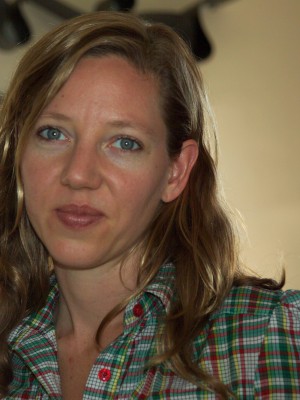
Millicent Hodson
Host: Lisa Fusillo (Department of Dance)
Date: April 16, 2013, 11 am
Dr. Millicent Hodson, American choreographer and dance historian, is best known for her research and pioneering reconstruction of the 1913 Nijinsky-Stravinsky ballet Le Sacre du Printemps (“The Rite of Spring”). This reconstruction work was done in tandem with designer and art historian Kenneth Archer, the leading expert on the work of Nicholas Roerich, the designer of the first production of Le Sacre. Drs. Hodson and Archer will visit UGA together.
Read more
Featured in the WNET/BBC film “The Search for Nijinsky’s Rite of Spring” and the ARTE film, “Les Printemps du Sacre”, Hodson with Archer has often been a guest on radio and television in the US, UK, and Europe. Their lectures are a lively combination of scholarly discourse, multimedia display, and, often, physical demonstration. In 1992 both were recipients of the Nijinsky Medal from Poland.
Hodson and Archer’s reconstruction of Le Sacre du Printemps was first produced by the Joffrey Ballet in 1987, revised (Chicago, 2001) and has had a significant number of productions since, including the Paris Opera Ballet (1991), the Finnish National Ballet (1994), Companhia Nacional de Mailado, Lisbon (1994), the Zurich Ballet (1995), the Ballet of the Theatro Municipal, Rio (1996), the Rome Opera Ballet (2001), and in April 2008 with the Kirov Ballet as part of the 300th Anniversary of the City of St. Petersburg.
Dr. Hodson’s book Nijinsky’s Crime Against Grace: Reconstruction Score of the original choreography for ‘Le Sacre du Printemps’ (Pendragon Press, 1998) has become a standard reference for dancers, artists, and musicologists interested in the phenomenon of “The Rite of Spring” in dance reconstruction and in 20th century cultural studies in general. Dr. Archer’s book Nicholas Roerich was published by Parkstone Press in English and French (Bournemouth and Paris, 1999). His monograph on Roerich was published in Russian by Pinokoteka (Moscow, 2000).
Dr. Hodson has been a Senior Lecturer in Music and Dance at Princeton University (2005), and has also taught at Roehampton University, the University of Surrey and Middlesex University in England. She is the recipient of numerous fellowships in writing and choreography, including the Selma Jean Cohen Fellowship (Fulbright Association, 2004), the Patten Lecturer at Indiana University, Bloomington (2003) and an NEA Bicentennial Fellowship in dance for work in the UK. Dr. Archer is the leading expert on the work of Nicholas Roerich, designer of the original production of “Sacre”, and has received grants from the Indian Council for Cultural Relations in India and International Research and Exchanges Board in New York to document collections of Roerich paintings in India, Paris, Moscow, and Leningrad. Dr. Archer was featured at the international Roerich conference in New Delhi in 2009.
Dr. Archer received the PhD in Art History and Theory from the University of Essex, England and Dr. Hodson received the PhD in Cinema and the Arts of Spectacle from the University of California, Berkeley.
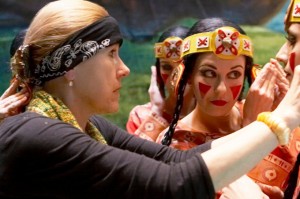
Dalia Judovitz
Host: Susan Rosenbaum (Department of English)
Title: “Artistic Gesture and Critical Commentary: Duchamp and Lyotard”
Date: April 18, 2013, 4 pm
Dalia Judovitz is the NEH Professor of French at Emory University, and is widely recognized as one of the foremost scholars of Marcel Duchamp, the 20th-century artist whose artwork, performances, and writing have influenced work in disciplines across the humanities and arts. Judovitz’s books on Duchamp, Drawing on Art: Duchamp & Company (Minnesota, 2010) and Unpacking Duchamp: Art in Transit (University of CA, 1995, 1998; Fr. trans. 2000) are highly original and yet accessible, demonstrating the nature of Duchamp’s inquiries and enduring influence.
Read more
Professor Judovitz was a student of Jean-Francois Lyotard and like Lyotard, she has explored modernity in its many guises and in its early and late forms. She is the author of The Culture of the Body: Genealogies of Modernity (2001) and of Subjectivity and Representation in Descartes: The Origins of Modernity (1988), and she is the co-editor of Dialectics and Narrative(1993) and of the University of Michigan Press book series The Body, in Theory: Histories of Cultural Materialism. Professor Judovitz is currently working on a book titled Georges de la Tour: The Enigma of the Visible.
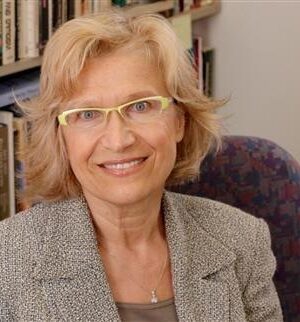
Scott Russell Sanders
Host: Stephen Corey, The Georgia Review
Title: “Near and Distant Bears”
Date: April 22, 2013
The gravest threat to human well-being is not terrorism, economic depression, or disease; it is the degradation, on a planetary scale, of the conditions necessary for life. What shift in outlook and values would be required if we are to halt that unraveling and begin the work of restoration?
Read more
Scott Russell Sanders is the author of 20 books of fiction and nonfiction, including A Private History of Awe and A Conservationist Manifesto. The best of his essays from the past 30 years, plus nine new essays, are collected in Earth Works, published in 2012 by Indiana University Press. Among his honors are the Lannan Literary Award, the John Burroughs Essay Award, the Mark Twain Award, the Cecil Woods Award for Nonfiction, the Eugene and Marilyn Glick Indiana Authors Award, and fellowships from the Guggenheim Foundation and the National Endowment for the Arts. In 2012 he was elected to the American Academy of Arts and Sciences. He is a Distinguished Professor Emeritus of English at Indiana University, where he taught from 1971 to 2009. He and his wife, Ruth, a biochemist, have reared two children in their hometown of Bloomington, in the hardwood hill country of Indiana’s White River Valley.
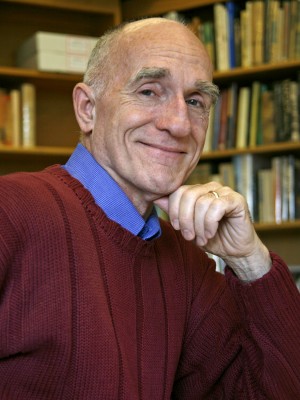
Peter Brown
Host: Erika Hermanowicz (Department of Classics)
Date: March, 2013
Peter Brown, the Philip and Beulah Rollins Professor of History at Princeton University, Emeritus, is credited with having created the field referred to as late antiquity (250-800 A.D.), the period during which Rome fell, the three major monotheistic religions took shape, and Christianity spread across Europe. Professor Brown’s primary interests are the transition from antiquity to the Middle Ages and the rise of Christianity, and he has pursued them through investigations into such diverse topics as Roman rhetoric, the cult of the saints, the body and sexuality, and wealth and poverty. He is the author of more than a dozen books, including Augustine of Hippo (1967, 2000), The Body and Society (1988), The Rise of Western Christendom (1996, 2003), and Through the Eye of a Needle: Wealth, the Fall of Rome, and the Making of Christianity in the West, 350-550 A.D. (2012). He will speak at the University of Georgia in March of 2013.
